Entrepreneurship and Small Business Management
VerifiedAdded on 2023/01/13
|22
|5713
|70
AI Summary
This document discusses the types of entrepreneurship ventures, their correlation with the topology of entrepreneurship, the impact of micro and small businesses on the economy, and the attributes of successful entrepreneurs. It also explores the scope, development, and growth of entrepreneurial ventures in both the public and private sectors.
Contribute Materials
Your contribution can guide someone’s learning journey. Share your
documents today.

Unit 9 -
Entrepreneurship and
Small Business
Management
Entrepreneurship and
Small Business
Management
Secure Best Marks with AI Grader
Need help grading? Try our AI Grader for instant feedback on your assignments.
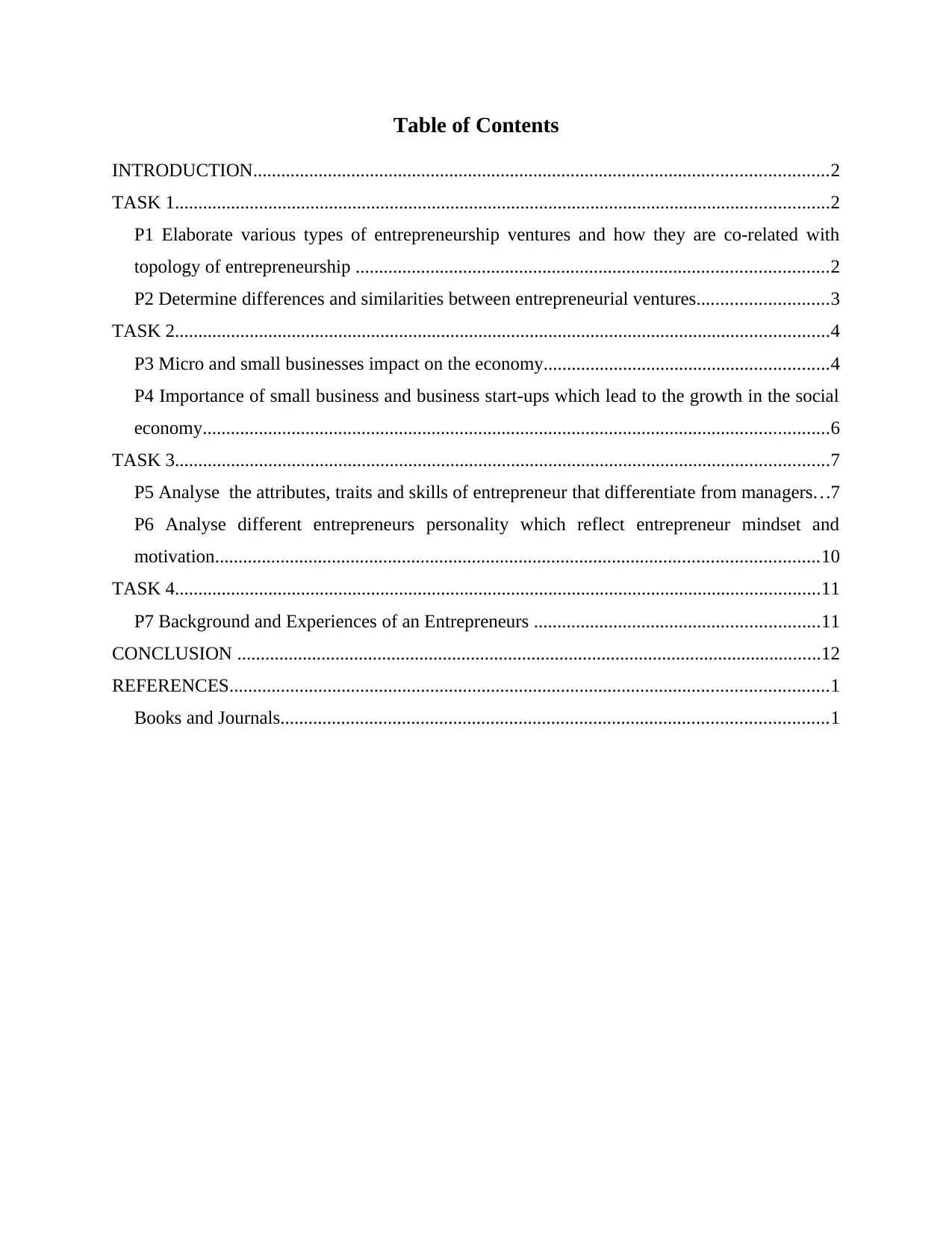
Table of Contents
INTRODUCTION...........................................................................................................................2
TASK 1............................................................................................................................................2
P1 Elaborate various types of entrepreneurship ventures and how they are co-related with
topology of entrepreneurship .....................................................................................................2
P2 Determine differences and similarities between entrepreneurial ventures............................3
TASK 2............................................................................................................................................4
P3 Micro and small businesses impact on the economy.............................................................4
P4 Importance of small business and business start-ups which lead to the growth in the social
economy......................................................................................................................................6
TASK 3............................................................................................................................................7
P5 Analyse the attributes, traits and skills of entrepreneur that differentiate from managers...7
P6 Analyse different entrepreneurs personality which reflect entrepreneur mindset and
motivation.................................................................................................................................10
TASK 4..........................................................................................................................................11
P7 Background and Experiences of an Entrepreneurs .............................................................11
CONCLUSION .............................................................................................................................12
REFERENCES................................................................................................................................1
Books and Journals.....................................................................................................................1
INTRODUCTION...........................................................................................................................2
TASK 1............................................................................................................................................2
P1 Elaborate various types of entrepreneurship ventures and how they are co-related with
topology of entrepreneurship .....................................................................................................2
P2 Determine differences and similarities between entrepreneurial ventures............................3
TASK 2............................................................................................................................................4
P3 Micro and small businesses impact on the economy.............................................................4
P4 Importance of small business and business start-ups which lead to the growth in the social
economy......................................................................................................................................6
TASK 3............................................................................................................................................7
P5 Analyse the attributes, traits and skills of entrepreneur that differentiate from managers...7
P6 Analyse different entrepreneurs personality which reflect entrepreneur mindset and
motivation.................................................................................................................................10
TASK 4..........................................................................................................................................11
P7 Background and Experiences of an Entrepreneurs .............................................................11
CONCLUSION .............................................................................................................................12
REFERENCES................................................................................................................................1
Books and Journals.....................................................................................................................1
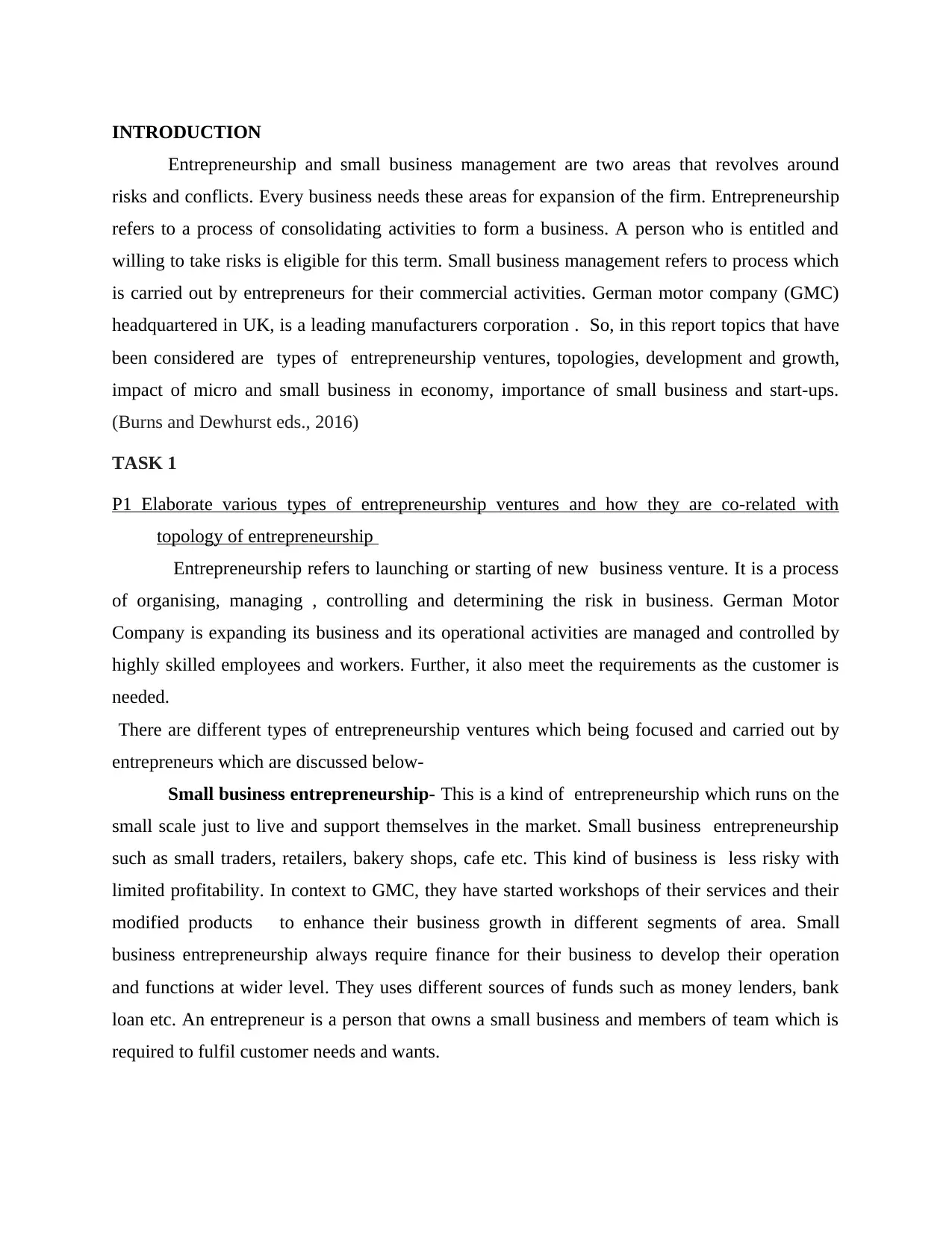
INTRODUCTION
Entrepreneurship and small business management are two areas that revolves around
risks and conflicts. Every business needs these areas for expansion of the firm. Entrepreneurship
refers to a process of consolidating activities to form a business. A person who is entitled and
willing to take risks is eligible for this term. Small business management refers to process which
is carried out by entrepreneurs for their commercial activities. German motor company (GMC)
headquartered in UK, is a leading manufacturers corporation . So, in this report topics that have
been considered are types of entrepreneurship ventures, topologies, development and growth,
impact of micro and small business in economy, importance of small business and start-ups.
(Burns and Dewhurst eds., 2016)
TASK 1
P1 Elaborate various types of entrepreneurship ventures and how they are co-related with
topology of entrepreneurship
Entrepreneurship refers to launching or starting of new business venture. It is a process
of organising, managing , controlling and determining the risk in business. German Motor
Company is expanding its business and its operational activities are managed and controlled by
highly skilled employees and workers. Further, it also meet the requirements as the customer is
needed.
There are different types of entrepreneurship ventures which being focused and carried out by
entrepreneurs which are discussed below-
Small business entrepreneurship- This is a kind of entrepreneurship which runs on the
small scale just to live and support themselves in the market. Small business entrepreneurship
such as small traders, retailers, bakery shops, cafe etc. This kind of business is less risky with
limited profitability. In context to GMC, they have started workshops of their services and their
modified products to enhance their business growth in different segments of area. Small
business entrepreneurship always require finance for their business to develop their operation
and functions at wider level. They uses different sources of funds such as money lenders, bank
loan etc. An entrepreneur is a person that owns a small business and members of team which is
required to fulfil customer needs and wants.
Entrepreneurship and small business management are two areas that revolves around
risks and conflicts. Every business needs these areas for expansion of the firm. Entrepreneurship
refers to a process of consolidating activities to form a business. A person who is entitled and
willing to take risks is eligible for this term. Small business management refers to process which
is carried out by entrepreneurs for their commercial activities. German motor company (GMC)
headquartered in UK, is a leading manufacturers corporation . So, in this report topics that have
been considered are types of entrepreneurship ventures, topologies, development and growth,
impact of micro and small business in economy, importance of small business and start-ups.
(Burns and Dewhurst eds., 2016)
TASK 1
P1 Elaborate various types of entrepreneurship ventures and how they are co-related with
topology of entrepreneurship
Entrepreneurship refers to launching or starting of new business venture. It is a process
of organising, managing , controlling and determining the risk in business. German Motor
Company is expanding its business and its operational activities are managed and controlled by
highly skilled employees and workers. Further, it also meet the requirements as the customer is
needed.
There are different types of entrepreneurship ventures which being focused and carried out by
entrepreneurs which are discussed below-
Small business entrepreneurship- This is a kind of entrepreneurship which runs on the
small scale just to live and support themselves in the market. Small business entrepreneurship
such as small traders, retailers, bakery shops, cafe etc. This kind of business is less risky with
limited profitability. In context to GMC, they have started workshops of their services and their
modified products to enhance their business growth in different segments of area. Small
business entrepreneurship always require finance for their business to develop their operation
and functions at wider level. They uses different sources of funds such as money lenders, bank
loan etc. An entrepreneur is a person that owns a small business and members of team which is
required to fulfil customer needs and wants.
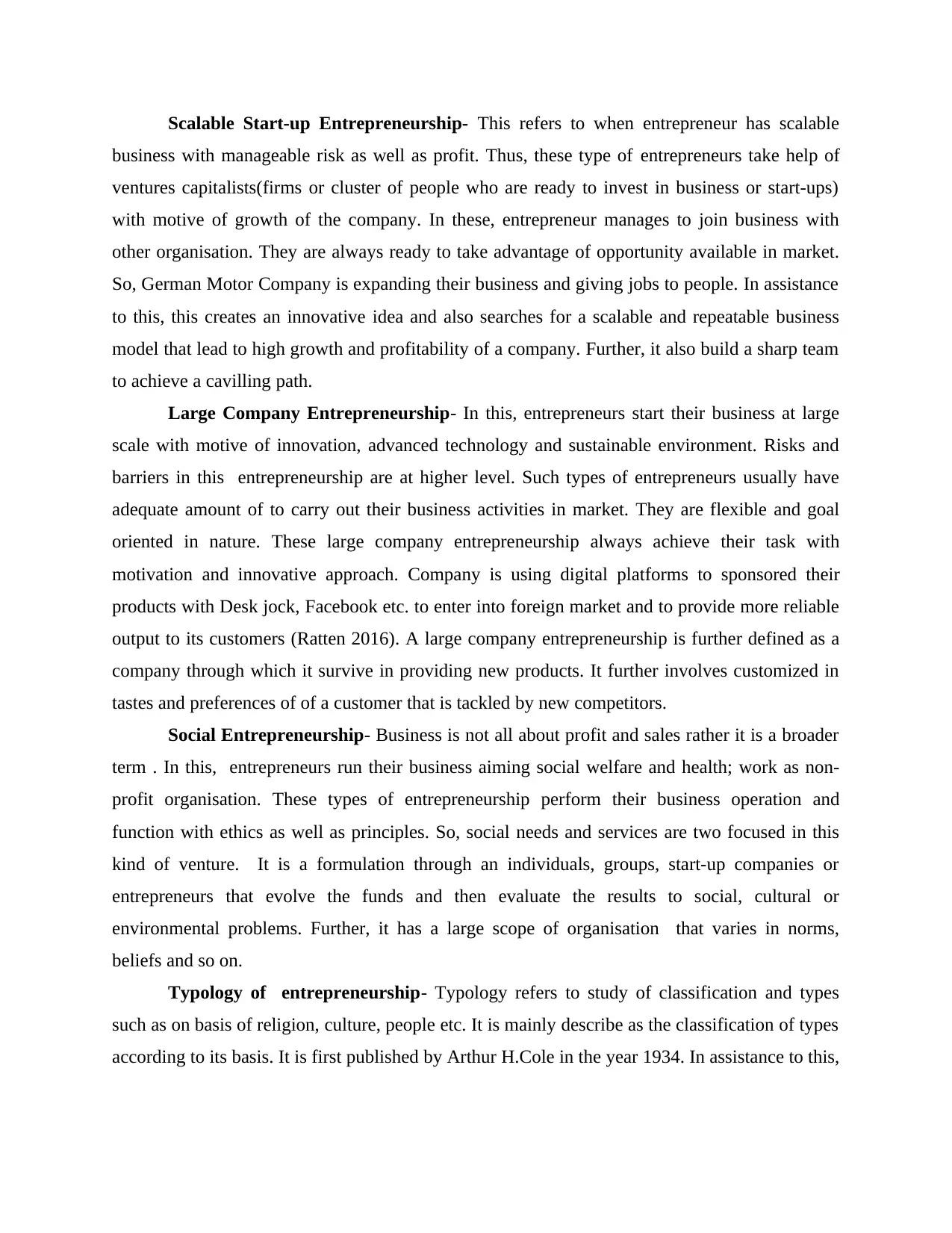
Scalable Start-up Entrepreneurship- This refers to when entrepreneur has scalable
business with manageable risk as well as profit. Thus, these type of entrepreneurs take help of
ventures capitalists(firms or cluster of people who are ready to invest in business or start-ups)
with motive of growth of the company. In these, entrepreneur manages to join business with
other organisation. They are always ready to take advantage of opportunity available in market.
So, German Motor Company is expanding their business and giving jobs to people. In assistance
to this, this creates an innovative idea and also searches for a scalable and repeatable business
model that lead to high growth and profitability of a company. Further, it also build a sharp team
to achieve a cavilling path.
Large Company Entrepreneurship- In this, entrepreneurs start their business at large
scale with motive of innovation, advanced technology and sustainable environment. Risks and
barriers in this entrepreneurship are at higher level. Such types of entrepreneurs usually have
adequate amount of to carry out their business activities in market. They are flexible and goal
oriented in nature. These large company entrepreneurship always achieve their task with
motivation and innovative approach. Company is using digital platforms to sponsored their
products with Desk jock, Facebook etc. to enter into foreign market and to provide more reliable
output to its customers (Ratten 2016). A large company entrepreneurship is further defined as a
company through which it survive in providing new products. It further involves customized in
tastes and preferences of of a customer that is tackled by new competitors.
Social Entrepreneurship- Business is not all about profit and sales rather it is a broader
term . In this, entrepreneurs run their business aiming social welfare and health; work as non-
profit organisation. These types of entrepreneurship perform their business operation and
function with ethics as well as principles. So, social needs and services are two focused in this
kind of venture. It is a formulation through an individuals, groups, start-up companies or
entrepreneurs that evolve the funds and then evaluate the results to social, cultural or
environmental problems. Further, it has a large scope of organisation that varies in norms,
beliefs and so on.
Typology of entrepreneurship- Typology refers to study of classification and types
such as on basis of religion, culture, people etc. It is mainly describe as the classification of types
according to its basis. It is first published by Arthur H.Cole in the year 1934. In assistance to this,
business with manageable risk as well as profit. Thus, these type of entrepreneurs take help of
ventures capitalists(firms or cluster of people who are ready to invest in business or start-ups)
with motive of growth of the company. In these, entrepreneur manages to join business with
other organisation. They are always ready to take advantage of opportunity available in market.
So, German Motor Company is expanding their business and giving jobs to people. In assistance
to this, this creates an innovative idea and also searches for a scalable and repeatable business
model that lead to high growth and profitability of a company. Further, it also build a sharp team
to achieve a cavilling path.
Large Company Entrepreneurship- In this, entrepreneurs start their business at large
scale with motive of innovation, advanced technology and sustainable environment. Risks and
barriers in this entrepreneurship are at higher level. Such types of entrepreneurs usually have
adequate amount of to carry out their business activities in market. They are flexible and goal
oriented in nature. These large company entrepreneurship always achieve their task with
motivation and innovative approach. Company is using digital platforms to sponsored their
products with Desk jock, Facebook etc. to enter into foreign market and to provide more reliable
output to its customers (Ratten 2016). A large company entrepreneurship is further defined as a
company through which it survive in providing new products. It further involves customized in
tastes and preferences of of a customer that is tackled by new competitors.
Social Entrepreneurship- Business is not all about profit and sales rather it is a broader
term . In this, entrepreneurs run their business aiming social welfare and health; work as non-
profit organisation. These types of entrepreneurship perform their business operation and
function with ethics as well as principles. So, social needs and services are two focused in this
kind of venture. It is a formulation through an individuals, groups, start-up companies or
entrepreneurs that evolve the funds and then evaluate the results to social, cultural or
environmental problems. Further, it has a large scope of organisation that varies in norms,
beliefs and so on.
Typology of entrepreneurship- Typology refers to study of classification and types
such as on basis of religion, culture, people etc. It is mainly describe as the classification of types
according to its basis. It is first published by Arthur H.Cole in the year 1934. In assistance to this,
Secure Best Marks with AI Grader
Need help grading? Try our AI Grader for instant feedback on your assignments.
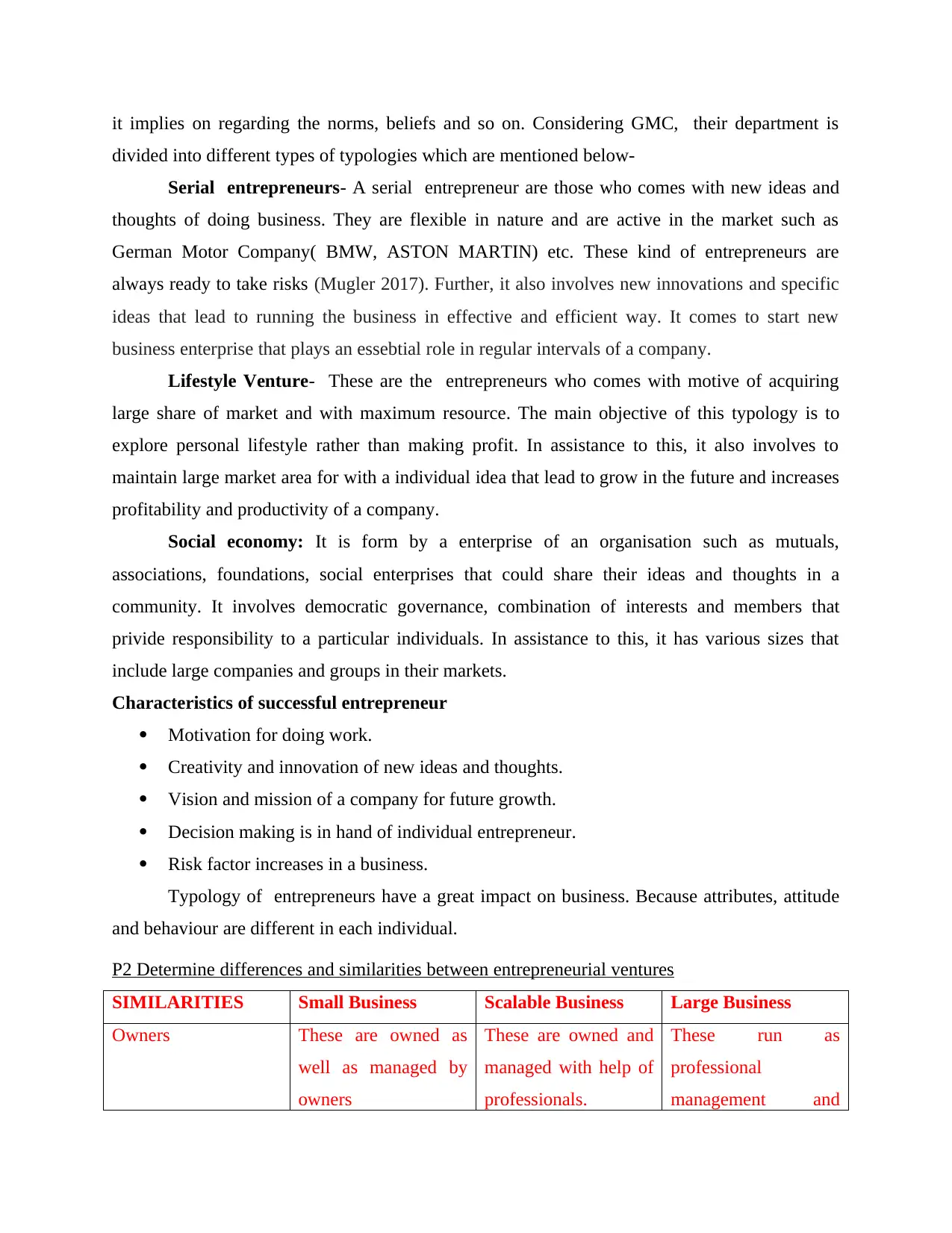
it implies on regarding the norms, beliefs and so on. Considering GMC, their department is
divided into different types of typologies which are mentioned below-
Serial entrepreneurs- A serial entrepreneur are those who comes with new ideas and
thoughts of doing business. They are flexible in nature and are active in the market such as
German Motor Company( BMW, ASTON MARTIN) etc. These kind of entrepreneurs are
always ready to take risks (Mugler 2017). Further, it also involves new innovations and specific
ideas that lead to running the business in effective and efficient way. It comes to start new
business enterprise that plays an essebtial role in regular intervals of a company.
Lifestyle Venture- These are the entrepreneurs who comes with motive of acquiring
large share of market and with maximum resource. The main objective of this typology is to
explore personal lifestyle rather than making profit. In assistance to this, it also involves to
maintain large market area for with a individual idea that lead to grow in the future and increases
profitability and productivity of a company.
Social economy: It is form by a enterprise of an organisation such as mutuals,
associations, foundations, social enterprises that could share their ideas and thoughts in a
community. It involves democratic governance, combination of interests and members that
privide responsibility to a particular individuals. In assistance to this, it has various sizes that
include large companies and groups in their markets.
Characteristics of successful entrepreneur
Motivation for doing work.
Creativity and innovation of new ideas and thoughts.
Vision and mission of a company for future growth.
Decision making is in hand of individual entrepreneur.
Risk factor increases in a business.
Typology of entrepreneurs have a great impact on business. Because attributes, attitude
and behaviour are different in each individual.
P2 Determine differences and similarities between entrepreneurial ventures
SIMILARITIES Small Business Scalable Business Large Business
Owners These are owned as
well as managed by
owners
These are owned and
managed with help of
professionals.
These run as
professional
management and
divided into different types of typologies which are mentioned below-
Serial entrepreneurs- A serial entrepreneur are those who comes with new ideas and
thoughts of doing business. They are flexible in nature and are active in the market such as
German Motor Company( BMW, ASTON MARTIN) etc. These kind of entrepreneurs are
always ready to take risks (Mugler 2017). Further, it also involves new innovations and specific
ideas that lead to running the business in effective and efficient way. It comes to start new
business enterprise that plays an essebtial role in regular intervals of a company.
Lifestyle Venture- These are the entrepreneurs who comes with motive of acquiring
large share of market and with maximum resource. The main objective of this typology is to
explore personal lifestyle rather than making profit. In assistance to this, it also involves to
maintain large market area for with a individual idea that lead to grow in the future and increases
profitability and productivity of a company.
Social economy: It is form by a enterprise of an organisation such as mutuals,
associations, foundations, social enterprises that could share their ideas and thoughts in a
community. It involves democratic governance, combination of interests and members that
privide responsibility to a particular individuals. In assistance to this, it has various sizes that
include large companies and groups in their markets.
Characteristics of successful entrepreneur
Motivation for doing work.
Creativity and innovation of new ideas and thoughts.
Vision and mission of a company for future growth.
Decision making is in hand of individual entrepreneur.
Risk factor increases in a business.
Typology of entrepreneurs have a great impact on business. Because attributes, attitude
and behaviour are different in each individual.
P2 Determine differences and similarities between entrepreneurial ventures
SIMILARITIES Small Business Scalable Business Large Business
Owners These are owned as
well as managed by
owners
These are owned and
managed with help of
professionals.
These run as
professional
management and
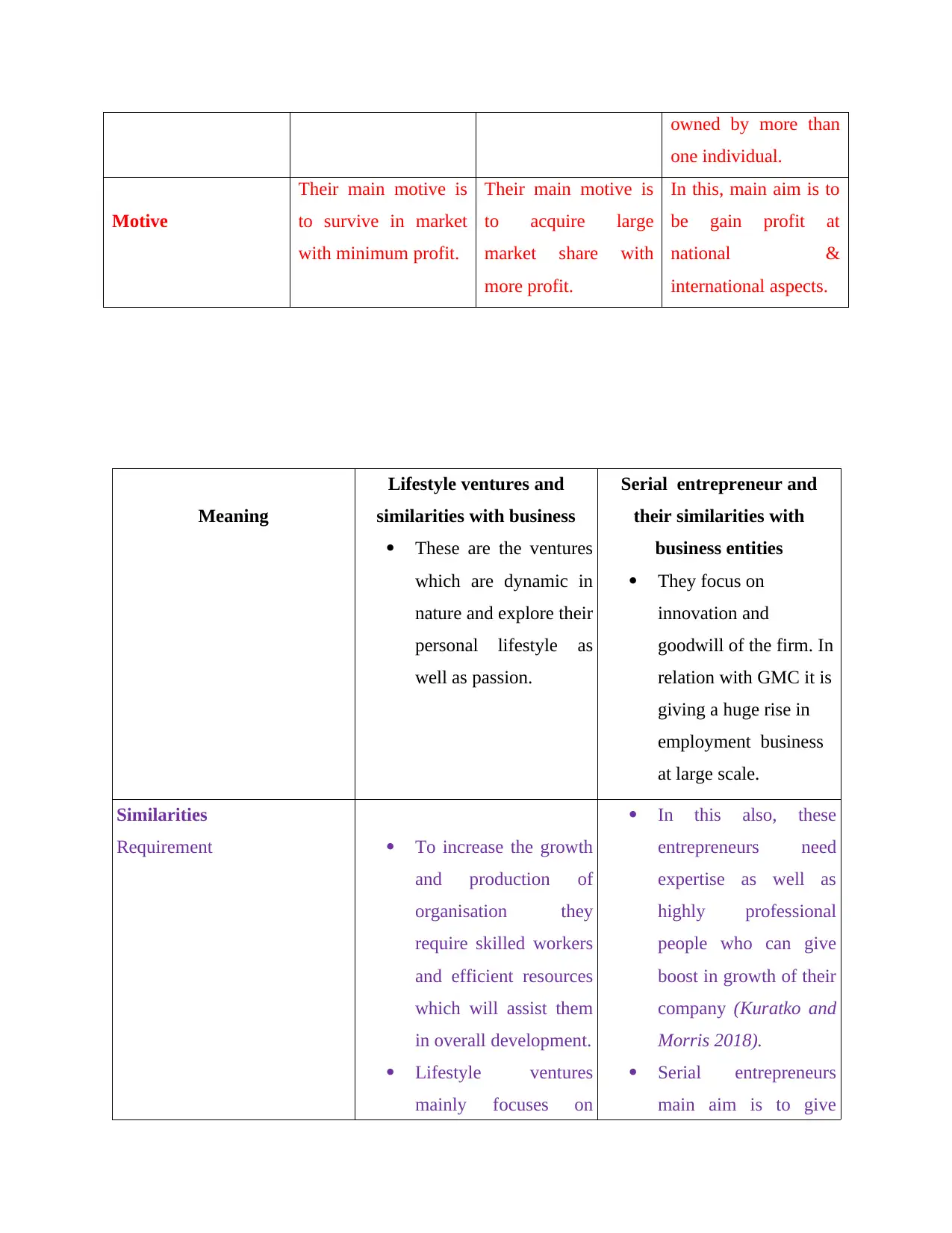
owned by more than
one individual.
Motive
Their main motive is
to survive in market
with minimum profit.
Their main motive is
to acquire large
market share with
more profit.
In this, main aim is to
be gain profit at
national &
international aspects.
Meaning
Lifestyle ventures and
similarities with business
These are the ventures
which are dynamic in
nature and explore their
personal lifestyle as
well as passion.
Serial entrepreneur and
their similarities with
business entities
They focus on
innovation and
goodwill of the firm. In
relation with GMC it is
giving a huge rise in
employment business
at large scale.
Similarities
Requirement To increase the growth
and production of
organisation they
require skilled workers
and efficient resources
which will assist them
in overall development.
Lifestyle ventures
mainly focuses on
In this also, these
entrepreneurs need
expertise as well as
highly professional
people who can give
boost in growth of their
company (Kuratko and
Morris 2018).
Serial entrepreneurs
main aim is to give
one individual.
Motive
Their main motive is
to survive in market
with minimum profit.
Their main motive is
to acquire large
market share with
more profit.
In this, main aim is to
be gain profit at
national &
international aspects.
Meaning
Lifestyle ventures and
similarities with business
These are the ventures
which are dynamic in
nature and explore their
personal lifestyle as
well as passion.
Serial entrepreneur and
their similarities with
business entities
They focus on
innovation and
goodwill of the firm. In
relation with GMC it is
giving a huge rise in
employment business
at large scale.
Similarities
Requirement To increase the growth
and production of
organisation they
require skilled workers
and efficient resources
which will assist them
in overall development.
Lifestyle ventures
mainly focuses on
In this also, these
entrepreneurs need
expertise as well as
highly professional
people who can give
boost in growth of their
company (Kuratko and
Morris 2018).
Serial entrepreneurs
main aim is to give
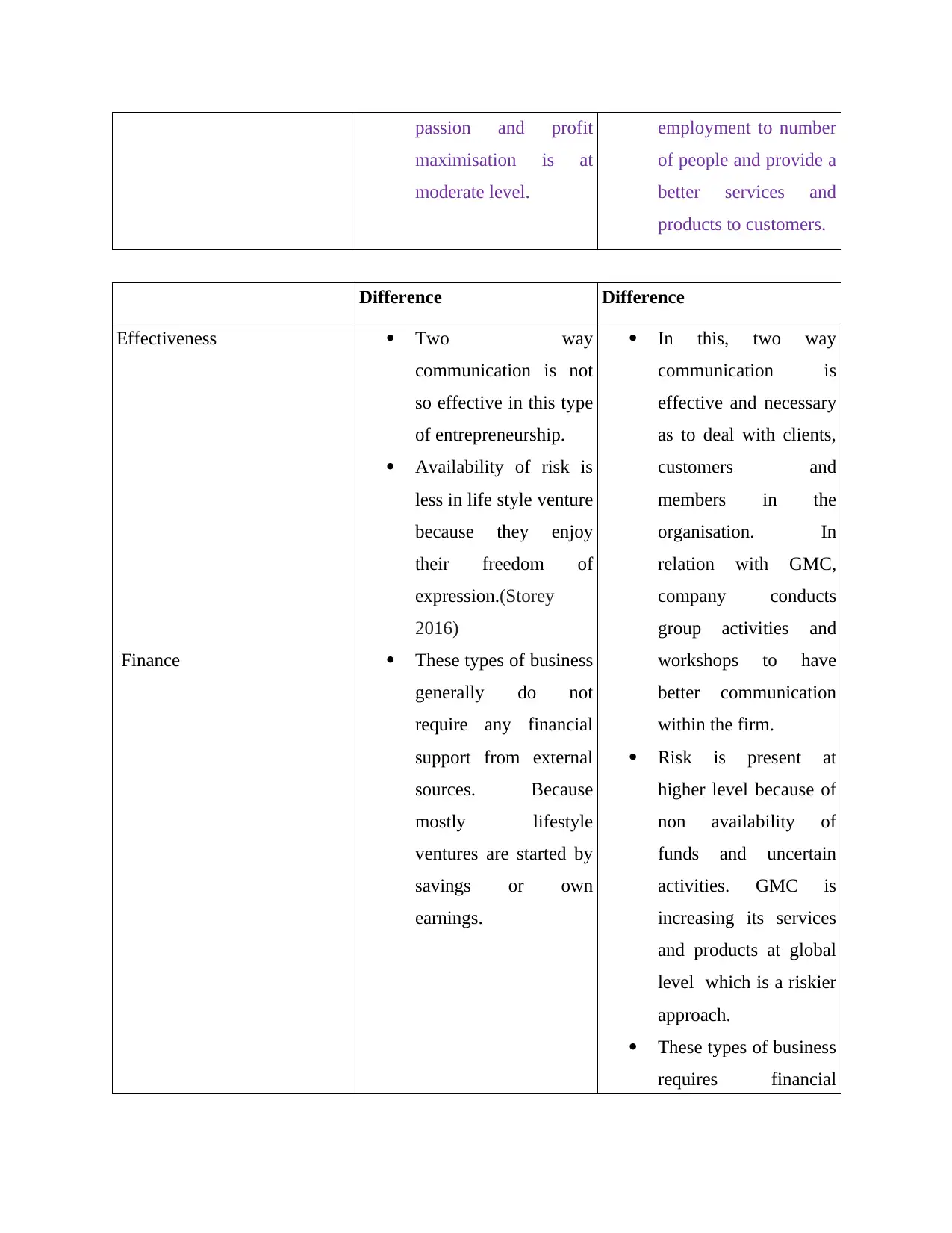
passion and profit
maximisation is at
moderate level.
employment to number
of people and provide a
better services and
products to customers.
Difference Difference
Effectiveness
Finance
Two way
communication is not
so effective in this type
of entrepreneurship.
Availability of risk is
less in life style venture
because they enjoy
their freedom of
expression.(Storey
2016)
These types of business
generally do not
require any financial
support from external
sources. Because
mostly lifestyle
ventures are started by
savings or own
earnings.
In this, two way
communication is
effective and necessary
as to deal with clients,
customers and
members in the
organisation. In
relation with GMC,
company conducts
group activities and
workshops to have
better communication
within the firm.
Risk is present at
higher level because of
non availability of
funds and uncertain
activities. GMC is
increasing its services
and products at global
level which is a riskier
approach.
These types of business
requires financial
maximisation is at
moderate level.
employment to number
of people and provide a
better services and
products to customers.
Difference Difference
Effectiveness
Finance
Two way
communication is not
so effective in this type
of entrepreneurship.
Availability of risk is
less in life style venture
because they enjoy
their freedom of
expression.(Storey
2016)
These types of business
generally do not
require any financial
support from external
sources. Because
mostly lifestyle
ventures are started by
savings or own
earnings.
In this, two way
communication is
effective and necessary
as to deal with clients,
customers and
members in the
organisation. In
relation with GMC,
company conducts
group activities and
workshops to have
better communication
within the firm.
Risk is present at
higher level because of
non availability of
funds and uncertain
activities. GMC is
increasing its services
and products at global
level which is a riskier
approach.
These types of business
requires financial
Paraphrase This Document
Need a fresh take? Get an instant paraphrase of this document with our AI Paraphraser
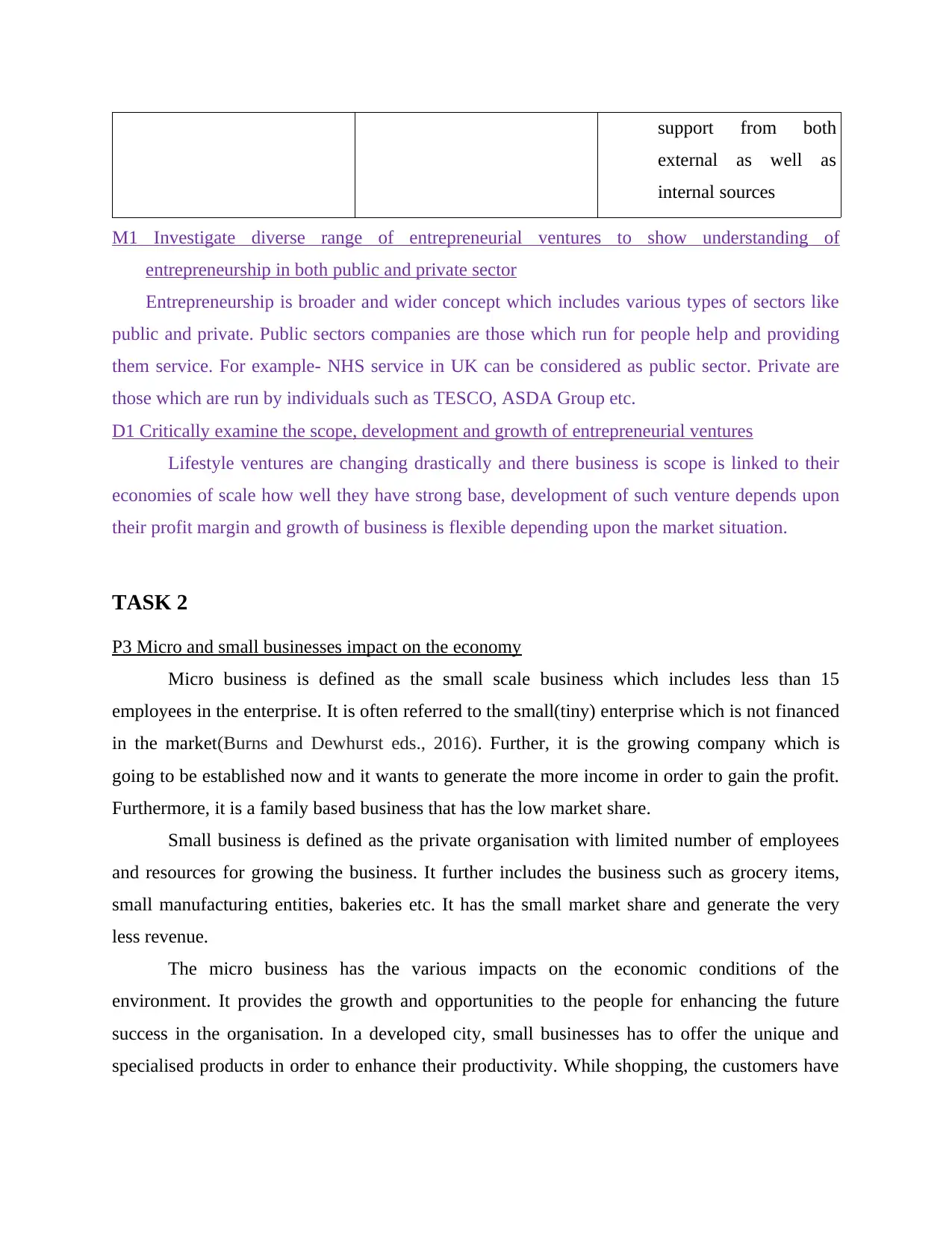
support from both
external as well as
internal sources
M1 Investigate diverse range of entrepreneurial ventures to show understanding of
entrepreneurship in both public and private sector
Entrepreneurship is broader and wider concept which includes various types of sectors like
public and private. Public sectors companies are those which run for people help and providing
them service. For example- NHS service in UK can be considered as public sector. Private are
those which are run by individuals such as TESCO, ASDA Group etc.
D1 Critically examine the scope, development and growth of entrepreneurial ventures
Lifestyle ventures are changing drastically and there business is scope is linked to their
economies of scale how well they have strong base, development of such venture depends upon
their profit margin and growth of business is flexible depending upon the market situation.
TASK 2
P3 Micro and small businesses impact on the economy
Micro business is defined as the small scale business which includes less than 15
employees in the enterprise. It is often referred to the small(tiny) enterprise which is not financed
in the market(Burns and Dewhurst eds., 2016). Further, it is the growing company which is
going to be established now and it wants to generate the more income in order to gain the profit.
Furthermore, it is a family based business that has the low market share.
Small business is defined as the private organisation with limited number of employees
and resources for growing the business. It further includes the business such as grocery items,
small manufacturing entities, bakeries etc. It has the small market share and generate the very
less revenue.
The micro business has the various impacts on the economic conditions of the
environment. It provides the growth and opportunities to the people for enhancing the future
success in the organisation. In a developed city, small businesses has to offer the unique and
specialised products in order to enhance their productivity. While shopping, the customers have
external as well as
internal sources
M1 Investigate diverse range of entrepreneurial ventures to show understanding of
entrepreneurship in both public and private sector
Entrepreneurship is broader and wider concept which includes various types of sectors like
public and private. Public sectors companies are those which run for people help and providing
them service. For example- NHS service in UK can be considered as public sector. Private are
those which are run by individuals such as TESCO, ASDA Group etc.
D1 Critically examine the scope, development and growth of entrepreneurial ventures
Lifestyle ventures are changing drastically and there business is scope is linked to their
economies of scale how well they have strong base, development of such venture depends upon
their profit margin and growth of business is flexible depending upon the market situation.
TASK 2
P3 Micro and small businesses impact on the economy
Micro business is defined as the small scale business which includes less than 15
employees in the enterprise. It is often referred to the small(tiny) enterprise which is not financed
in the market(Burns and Dewhurst eds., 2016). Further, it is the growing company which is
going to be established now and it wants to generate the more income in order to gain the profit.
Furthermore, it is a family based business that has the low market share.
Small business is defined as the private organisation with limited number of employees
and resources for growing the business. It further includes the business such as grocery items,
small manufacturing entities, bakeries etc. It has the small market share and generate the very
less revenue.
The micro business has the various impacts on the economic conditions of the
environment. It provides the growth and opportunities to the people for enhancing the future
success in the organisation. In a developed city, small businesses has to offer the unique and
specialised products in order to enhance their productivity. While shopping, the customers have
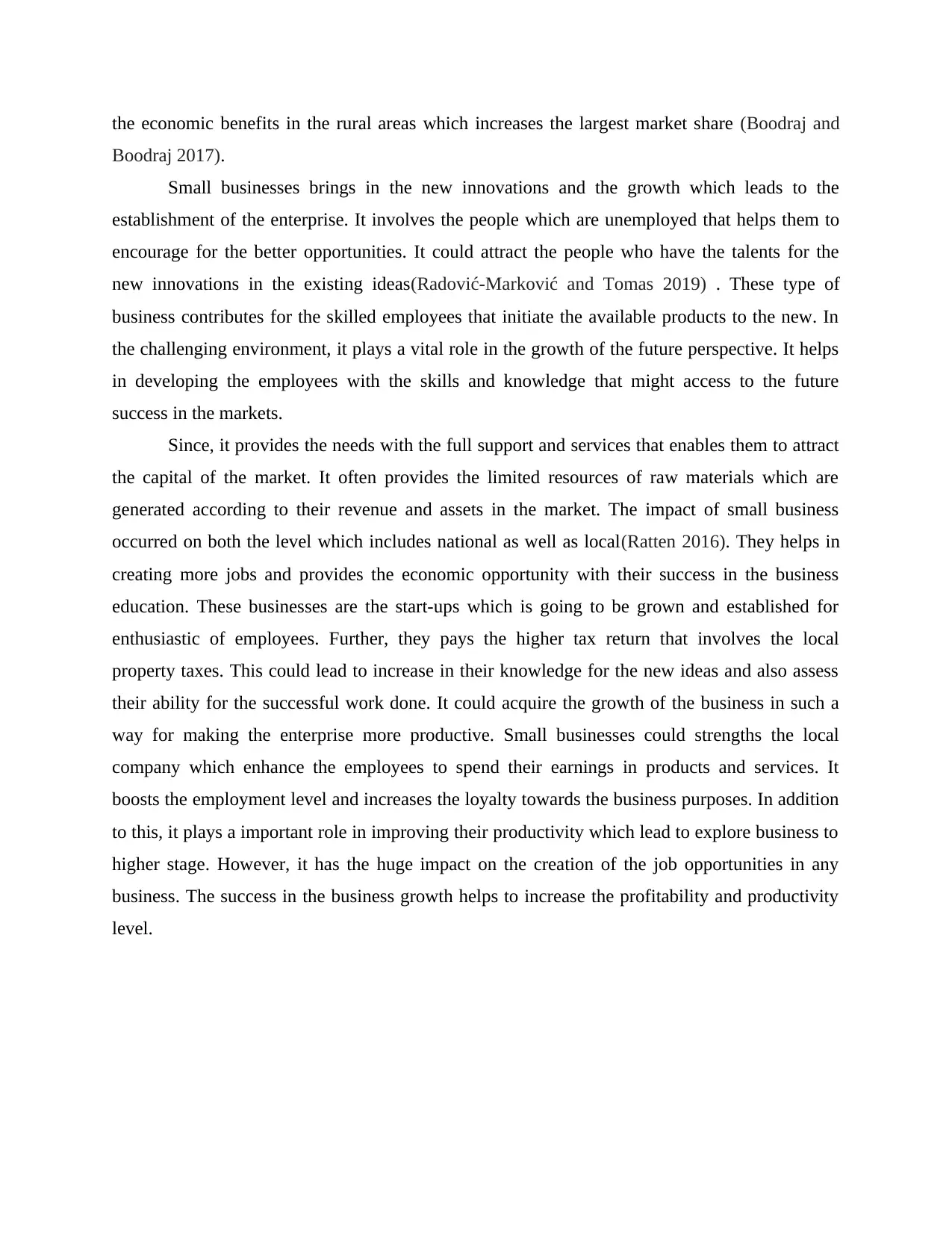
the economic benefits in the rural areas which increases the largest market share (Boodraj and
Boodraj 2017).
Small businesses brings in the new innovations and the growth which leads to the
establishment of the enterprise. It involves the people which are unemployed that helps them to
encourage for the better opportunities. It could attract the people who have the talents for the
new innovations in the existing ideas(Radović-Marković and Tomas 2019) . These type of
business contributes for the skilled employees that initiate the available products to the new. In
the challenging environment, it plays a vital role in the growth of the future perspective. It helps
in developing the employees with the skills and knowledge that might access to the future
success in the markets.
Since, it provides the needs with the full support and services that enables them to attract
the capital of the market. It often provides the limited resources of raw materials which are
generated according to their revenue and assets in the market. The impact of small business
occurred on both the level which includes national as well as local(Ratten 2016). They helps in
creating more jobs and provides the economic opportunity with their success in the business
education. These businesses are the start-ups which is going to be grown and established for
enthusiastic of employees. Further, they pays the higher tax return that involves the local
property taxes. This could lead to increase in their knowledge for the new ideas and also assess
their ability for the successful work done. It could acquire the growth of the business in such a
way for making the enterprise more productive. Small businesses could strengths the local
company which enhance the employees to spend their earnings in products and services. It
boosts the employment level and increases the loyalty towards the business purposes. In addition
to this, it plays a important role in improving their productivity which lead to explore business to
higher stage. However, it has the huge impact on the creation of the job opportunities in any
business. The success in the business growth helps to increase the profitability and productivity
level.
Boodraj 2017).
Small businesses brings in the new innovations and the growth which leads to the
establishment of the enterprise. It involves the people which are unemployed that helps them to
encourage for the better opportunities. It could attract the people who have the talents for the
new innovations in the existing ideas(Radović-Marković and Tomas 2019) . These type of
business contributes for the skilled employees that initiate the available products to the new. In
the challenging environment, it plays a vital role in the growth of the future perspective. It helps
in developing the employees with the skills and knowledge that might access to the future
success in the markets.
Since, it provides the needs with the full support and services that enables them to attract
the capital of the market. It often provides the limited resources of raw materials which are
generated according to their revenue and assets in the market. The impact of small business
occurred on both the level which includes national as well as local(Ratten 2016). They helps in
creating more jobs and provides the economic opportunity with their success in the business
education. These businesses are the start-ups which is going to be grown and established for
enthusiastic of employees. Further, they pays the higher tax return that involves the local
property taxes. This could lead to increase in their knowledge for the new ideas and also assess
their ability for the successful work done. It could acquire the growth of the business in such a
way for making the enterprise more productive. Small businesses could strengths the local
company which enhance the employees to spend their earnings in products and services. It
boosts the employment level and increases the loyalty towards the business purposes. In addition
to this, it plays a important role in improving their productivity which lead to explore business to
higher stage. However, it has the huge impact on the creation of the job opportunities in any
business. The success in the business growth helps to increase the profitability and productivity
level.
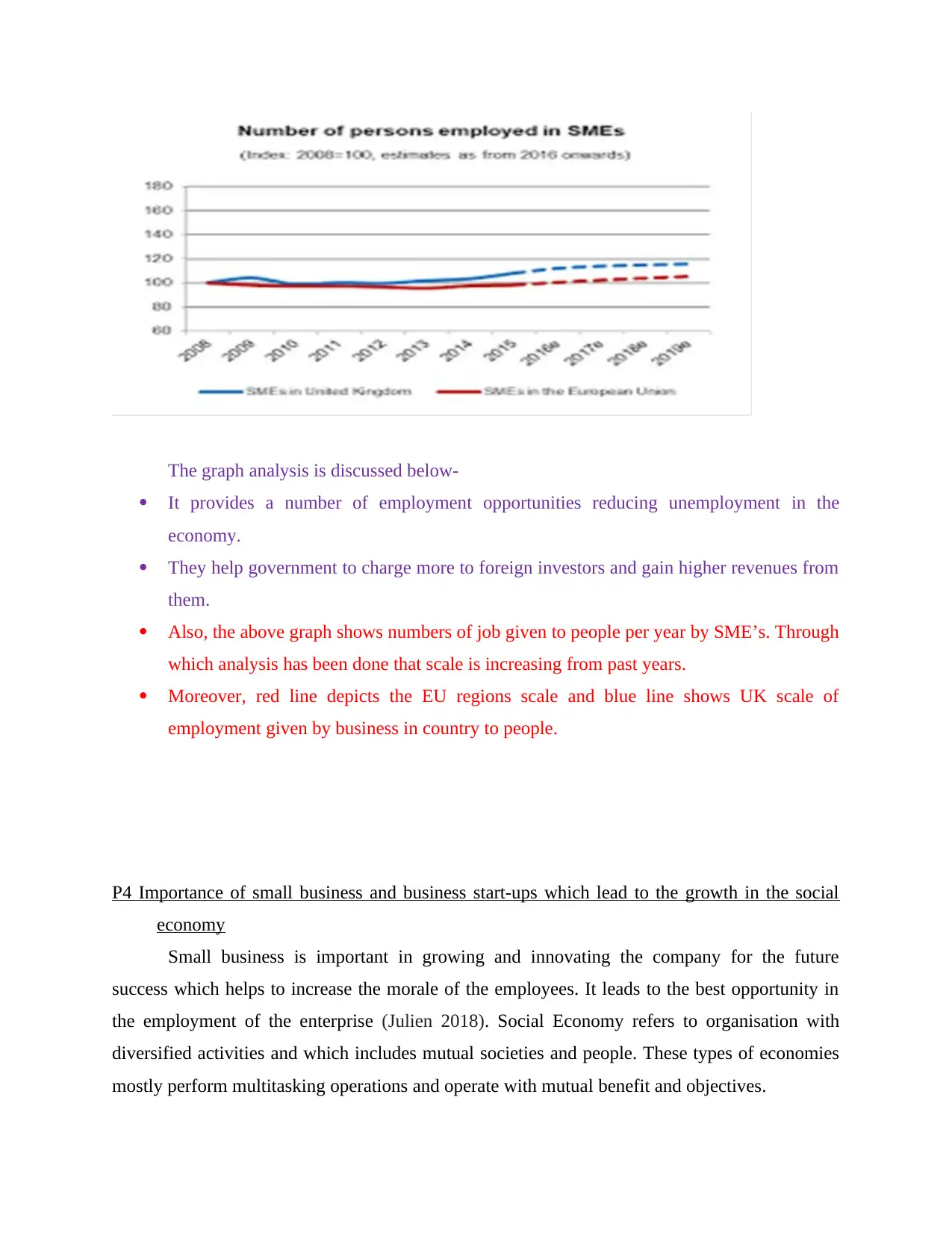
The graph analysis is discussed below-
It provides a number of employment opportunities reducing unemployment in the
economy.
They help government to charge more to foreign investors and gain higher revenues from
them.
Also, the above graph shows numbers of job given to people per year by SME’s. Through
which analysis has been done that scale is increasing from past years.
Moreover, red line depicts the EU regions scale and blue line shows UK scale of
employment given by business in country to people.
P4 Importance of small business and business start-ups which lead to the growth in the social
economy
Small business is important in growing and innovating the company for the future
success which helps to increase the morale of the employees. It leads to the best opportunity in
the employment of the enterprise (Julien 2018). Social Economy refers to organisation with
diversified activities and which includes mutual societies and people. These types of economies
mostly perform multitasking operations and operate with mutual benefit and objectives.
It provides a number of employment opportunities reducing unemployment in the
economy.
They help government to charge more to foreign investors and gain higher revenues from
them.
Also, the above graph shows numbers of job given to people per year by SME’s. Through
which analysis has been done that scale is increasing from past years.
Moreover, red line depicts the EU regions scale and blue line shows UK scale of
employment given by business in country to people.
P4 Importance of small business and business start-ups which lead to the growth in the social
economy
Small business is important in growing and innovating the company for the future
success which helps to increase the morale of the employees. It leads to the best opportunity in
the employment of the enterprise (Julien 2018). Social Economy refers to organisation with
diversified activities and which includes mutual societies and people. These types of economies
mostly perform multitasking operations and operate with mutual benefit and objectives.
Secure Best Marks with AI Grader
Need help grading? Try our AI Grader for instant feedback on your assignments.
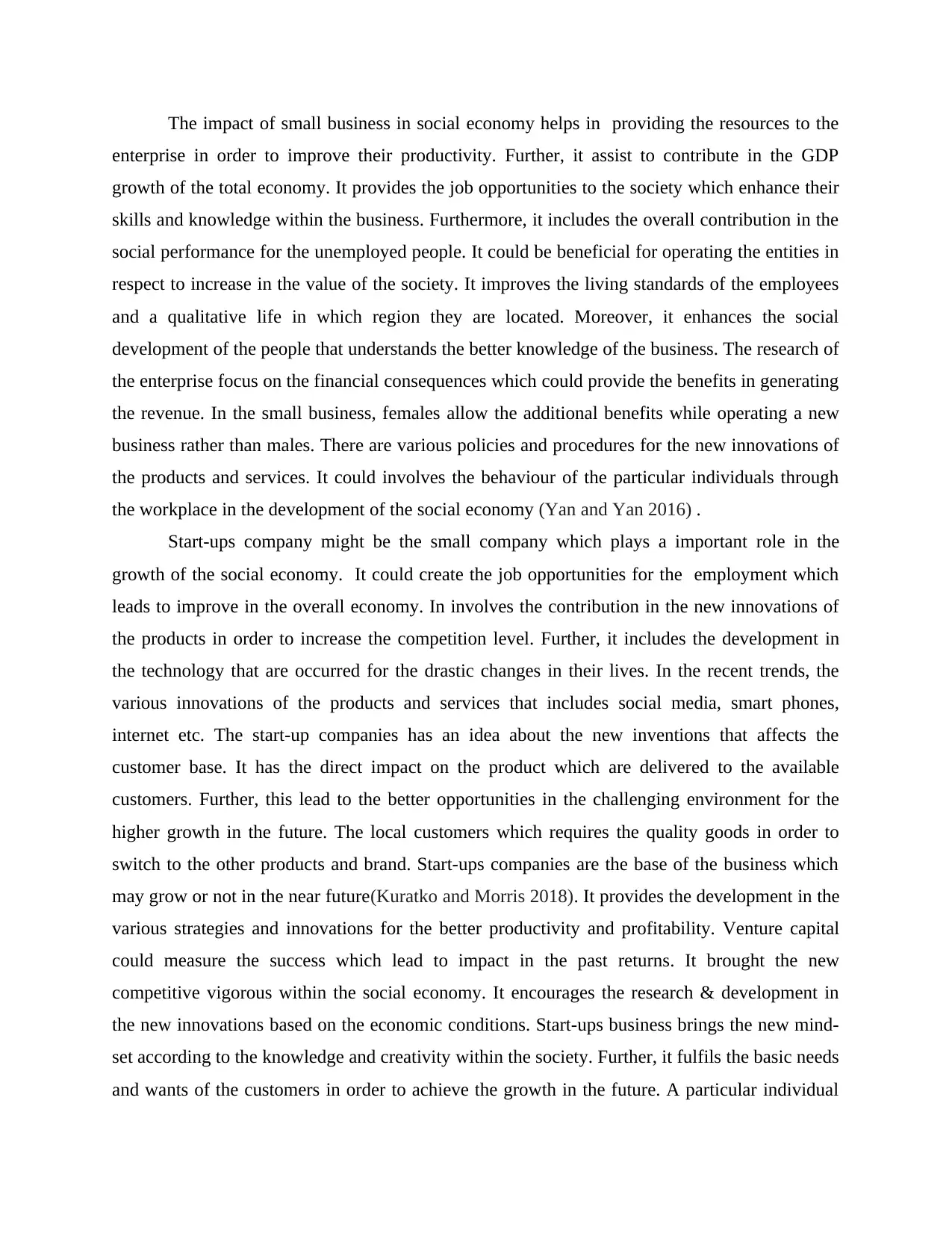
The impact of small business in social economy helps in providing the resources to the
enterprise in order to improve their productivity. Further, it assist to contribute in the GDP
growth of the total economy. It provides the job opportunities to the society which enhance their
skills and knowledge within the business. Furthermore, it includes the overall contribution in the
social performance for the unemployed people. It could be beneficial for operating the entities in
respect to increase in the value of the society. It improves the living standards of the employees
and a qualitative life in which region they are located. Moreover, it enhances the social
development of the people that understands the better knowledge of the business. The research of
the enterprise focus on the financial consequences which could provide the benefits in generating
the revenue. In the small business, females allow the additional benefits while operating a new
business rather than males. There are various policies and procedures for the new innovations of
the products and services. It could involves the behaviour of the particular individuals through
the workplace in the development of the social economy (Yan and Yan 2016) .
Start-ups company might be the small company which plays a important role in the
growth of the social economy. It could create the job opportunities for the employment which
leads to improve in the overall economy. In involves the contribution in the new innovations of
the products in order to increase the competition level. Further, it includes the development in
the technology that are occurred for the drastic changes in their lives. In the recent trends, the
various innovations of the products and services that includes social media, smart phones,
internet etc. The start-up companies has an idea about the new inventions that affects the
customer base. It has the direct impact on the product which are delivered to the available
customers. Further, this lead to the better opportunities in the challenging environment for the
higher growth in the future. The local customers which requires the quality goods in order to
switch to the other products and brand. Start-ups companies are the base of the business which
may grow or not in the near future(Kuratko and Morris 2018). It provides the development in the
various strategies and innovations for the better productivity and profitability. Venture capital
could measure the success which lead to impact in the past returns. It brought the new
competitive vigorous within the social economy. It encourages the research & development in
the new innovations based on the economic conditions. Start-ups business brings the new mind-
set according to the knowledge and creativity within the society. Further, it fulfils the basic needs
and wants of the customers in order to achieve the growth in the future. A particular individual
enterprise in order to improve their productivity. Further, it assist to contribute in the GDP
growth of the total economy. It provides the job opportunities to the society which enhance their
skills and knowledge within the business. Furthermore, it includes the overall contribution in the
social performance for the unemployed people. It could be beneficial for operating the entities in
respect to increase in the value of the society. It improves the living standards of the employees
and a qualitative life in which region they are located. Moreover, it enhances the social
development of the people that understands the better knowledge of the business. The research of
the enterprise focus on the financial consequences which could provide the benefits in generating
the revenue. In the small business, females allow the additional benefits while operating a new
business rather than males. There are various policies and procedures for the new innovations of
the products and services. It could involves the behaviour of the particular individuals through
the workplace in the development of the social economy (Yan and Yan 2016) .
Start-ups company might be the small company which plays a important role in the
growth of the social economy. It could create the job opportunities for the employment which
leads to improve in the overall economy. In involves the contribution in the new innovations of
the products in order to increase the competition level. Further, it includes the development in
the technology that are occurred for the drastic changes in their lives. In the recent trends, the
various innovations of the products and services that includes social media, smart phones,
internet etc. The start-up companies has an idea about the new inventions that affects the
customer base. It has the direct impact on the product which are delivered to the available
customers. Further, this lead to the better opportunities in the challenging environment for the
higher growth in the future. The local customers which requires the quality goods in order to
switch to the other products and brand. Start-ups companies are the base of the business which
may grow or not in the near future(Kuratko and Morris 2018). It provides the development in the
various strategies and innovations for the better productivity and profitability. Venture capital
could measure the success which lead to impact in the past returns. It brought the new
competitive vigorous within the social economy. It encourages the research & development in
the new innovations based on the economic conditions. Start-ups business brings the new mind-
set according to the knowledge and creativity within the society. Further, it fulfils the basic needs
and wants of the customers in order to achieve the growth in the future. A particular individual
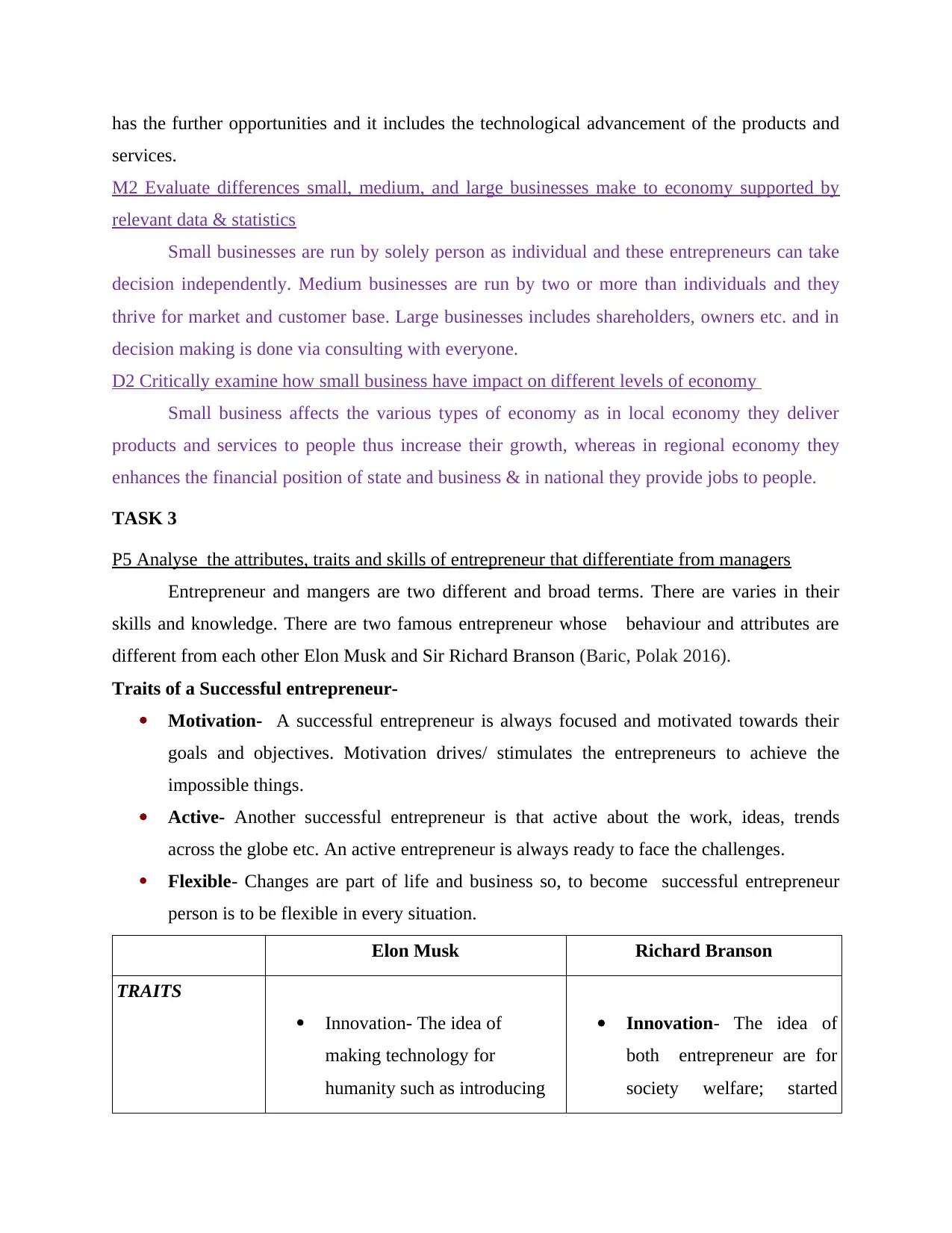
has the further opportunities and it includes the technological advancement of the products and
services.
M2 Evaluate differences small, medium, and large businesses make to economy supported by
relevant data & statistics
Small businesses are run by solely person as individual and these entrepreneurs can take
decision independently. Medium businesses are run by two or more than individuals and they
thrive for market and customer base. Large businesses includes shareholders, owners etc. and in
decision making is done via consulting with everyone.
D2 Critically examine how small business have impact on different levels of economy
Small business affects the various types of economy as in local economy they deliver
products and services to people thus increase their growth, whereas in regional economy they
enhances the financial position of state and business & in national they provide jobs to people.
TASK 3
P5 Analyse the attributes, traits and skills of entrepreneur that differentiate from managers
Entrepreneur and mangers are two different and broad terms. There are varies in their
skills and knowledge. There are two famous entrepreneur whose behaviour and attributes are
different from each other Elon Musk and Sir Richard Branson (Baric, Polak 2016).
Traits of a Successful entrepreneur-
Motivation- A successful entrepreneur is always focused and motivated towards their
goals and objectives. Motivation drives/ stimulates the entrepreneurs to achieve the
impossible things.
Active- Another successful entrepreneur is that active about the work, ideas, trends
across the globe etc. An active entrepreneur is always ready to face the challenges.
Flexible- Changes are part of life and business so, to become successful entrepreneur
person is to be flexible in every situation.
Elon Musk Richard Branson
TRAITS
Innovation- The idea of
making technology for
humanity such as introducing
Innovation- The idea of
both entrepreneur are for
society welfare; started
services.
M2 Evaluate differences small, medium, and large businesses make to economy supported by
relevant data & statistics
Small businesses are run by solely person as individual and these entrepreneurs can take
decision independently. Medium businesses are run by two or more than individuals and they
thrive for market and customer base. Large businesses includes shareholders, owners etc. and in
decision making is done via consulting with everyone.
D2 Critically examine how small business have impact on different levels of economy
Small business affects the various types of economy as in local economy they deliver
products and services to people thus increase their growth, whereas in regional economy they
enhances the financial position of state and business & in national they provide jobs to people.
TASK 3
P5 Analyse the attributes, traits and skills of entrepreneur that differentiate from managers
Entrepreneur and mangers are two different and broad terms. There are varies in their
skills and knowledge. There are two famous entrepreneur whose behaviour and attributes are
different from each other Elon Musk and Sir Richard Branson (Baric, Polak 2016).
Traits of a Successful entrepreneur-
Motivation- A successful entrepreneur is always focused and motivated towards their
goals and objectives. Motivation drives/ stimulates the entrepreneurs to achieve the
impossible things.
Active- Another successful entrepreneur is that active about the work, ideas, trends
across the globe etc. An active entrepreneur is always ready to face the challenges.
Flexible- Changes are part of life and business so, to become successful entrepreneur
person is to be flexible in every situation.
Elon Musk Richard Branson
TRAITS
Innovation- The idea of
making technology for
humanity such as introducing
Innovation- The idea of
both entrepreneur are for
society welfare; started
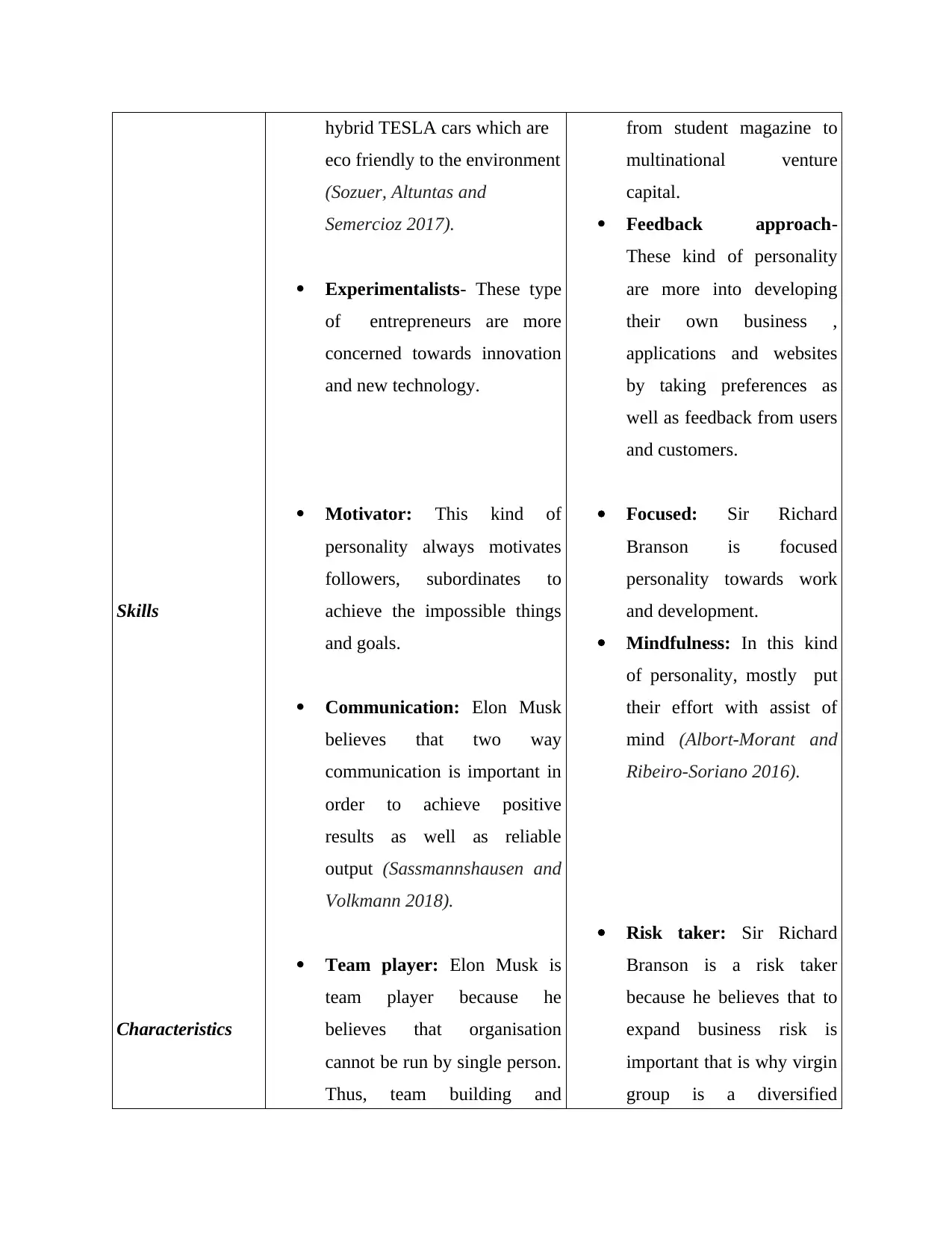
Skills
Characteristics
hybrid TESLA cars which are
eco friendly to the environment
(Sozuer, Altuntas and
Semercioz 2017).
Experimentalists- These type
of entrepreneurs are more
concerned towards innovation
and new technology.
Motivator: This kind of
personality always motivates
followers, subordinates to
achieve the impossible things
and goals.
Communication: Elon Musk
believes that two way
communication is important in
order to achieve positive
results as well as reliable
output (Sassmannshausen and
Volkmann 2018).
Team player: Elon Musk is
team player because he
believes that organisation
cannot be run by single person.
Thus, team building and
from student magazine to
multinational venture
capital.
Feedback approach-
These kind of personality
are more into developing
their own business ,
applications and websites
by taking preferences as
well as feedback from users
and customers.
Focused: Sir Richard
Branson is focused
personality towards work
and development.
Mindfulness: In this kind
of personality, mostly put
their effort with assist of
mind (Albort-Morant and
Ribeiro-Soriano 2016).
Risk taker: Sir Richard
Branson is a risk taker
because he believes that to
expand business risk is
important that is why virgin
group is a diversified
Characteristics
hybrid TESLA cars which are
eco friendly to the environment
(Sozuer, Altuntas and
Semercioz 2017).
Experimentalists- These type
of entrepreneurs are more
concerned towards innovation
and new technology.
Motivator: This kind of
personality always motivates
followers, subordinates to
achieve the impossible things
and goals.
Communication: Elon Musk
believes that two way
communication is important in
order to achieve positive
results as well as reliable
output (Sassmannshausen and
Volkmann 2018).
Team player: Elon Musk is
team player because he
believes that organisation
cannot be run by single person.
Thus, team building and
from student magazine to
multinational venture
capital.
Feedback approach-
These kind of personality
are more into developing
their own business ,
applications and websites
by taking preferences as
well as feedback from users
and customers.
Focused: Sir Richard
Branson is focused
personality towards work
and development.
Mindfulness: In this kind
of personality, mostly put
their effort with assist of
mind (Albort-Morant and
Ribeiro-Soriano 2016).
Risk taker: Sir Richard
Branson is a risk taker
because he believes that to
expand business risk is
important that is why virgin
group is a diversified
Paraphrase This Document
Need a fresh take? Get an instant paraphrase of this document with our AI Paraphraser
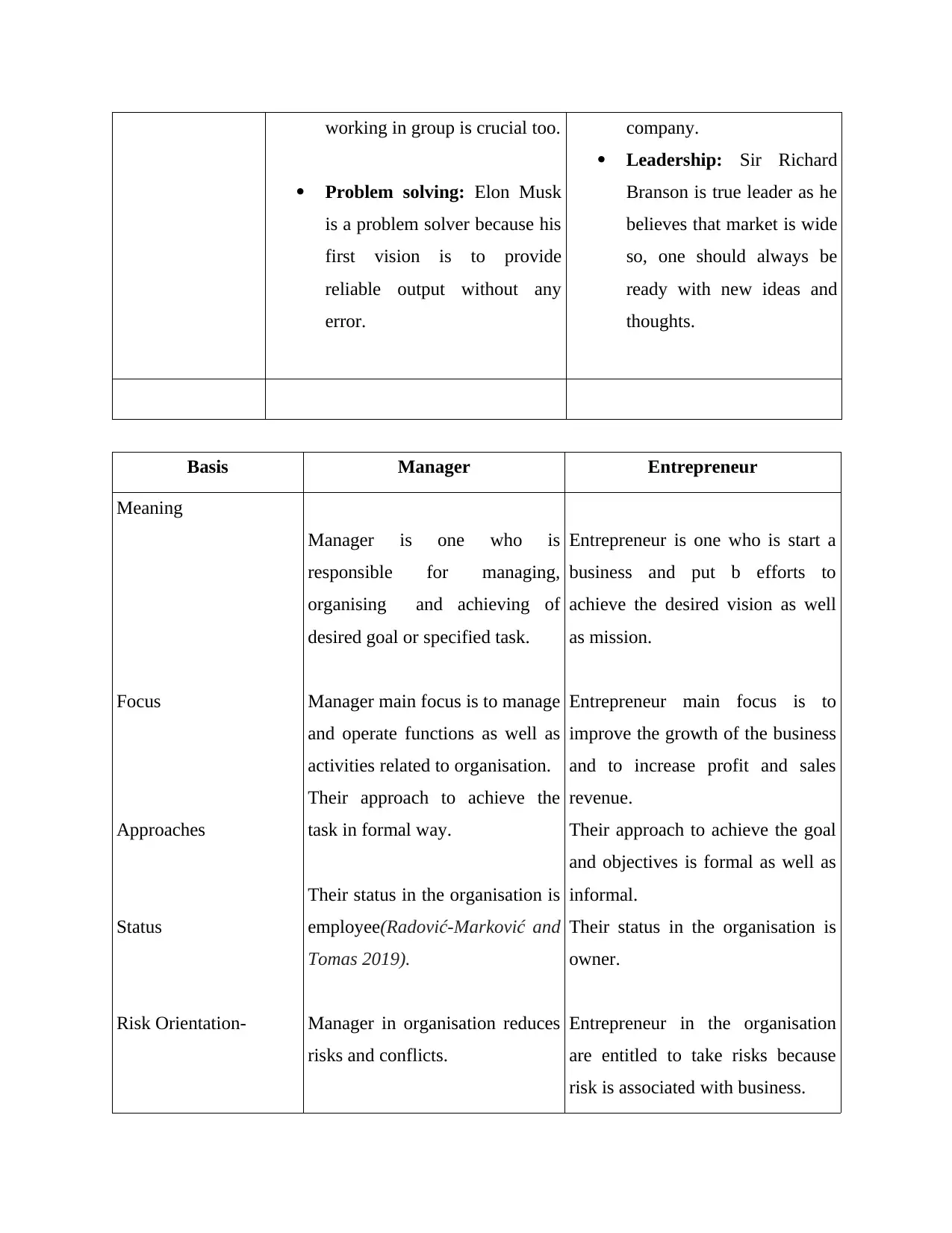
working in group is crucial too.
Problem solving: Elon Musk
is a problem solver because his
first vision is to provide
reliable output without any
error.
company.
Leadership: Sir Richard
Branson is true leader as he
believes that market is wide
so, one should always be
ready with new ideas and
thoughts.
Basis Manager Entrepreneur
Meaning
Focus
Approaches
Status
Risk Orientation-
Manager is one who is
responsible for managing,
organising and achieving of
desired goal or specified task.
Manager main focus is to manage
and operate functions as well as
activities related to organisation.
Their approach to achieve the
task in formal way.
Their status in the organisation is
employee(Radović-Marković and
Tomas 2019).
Manager in organisation reduces
risks and conflicts.
Entrepreneur is one who is start a
business and put b efforts to
achieve the desired vision as well
as mission.
Entrepreneur main focus is to
improve the growth of the business
and to increase profit and sales
revenue.
Their approach to achieve the goal
and objectives is formal as well as
informal.
Their status in the organisation is
owner.
Entrepreneur in the organisation
are entitled to take risks because
risk is associated with business.
Problem solving: Elon Musk
is a problem solver because his
first vision is to provide
reliable output without any
error.
company.
Leadership: Sir Richard
Branson is true leader as he
believes that market is wide
so, one should always be
ready with new ideas and
thoughts.
Basis Manager Entrepreneur
Meaning
Focus
Approaches
Status
Risk Orientation-
Manager is one who is
responsible for managing,
organising and achieving of
desired goal or specified task.
Manager main focus is to manage
and operate functions as well as
activities related to organisation.
Their approach to achieve the
task in formal way.
Their status in the organisation is
employee(Radović-Marković and
Tomas 2019).
Manager in organisation reduces
risks and conflicts.
Entrepreneur is one who is start a
business and put b efforts to
achieve the desired vision as well
as mission.
Entrepreneur main focus is to
improve the growth of the business
and to increase profit and sales
revenue.
Their approach to achieve the goal
and objectives is formal as well as
informal.
Their status in the organisation is
owner.
Entrepreneur in the organisation
are entitled to take risks because
risk is associated with business.
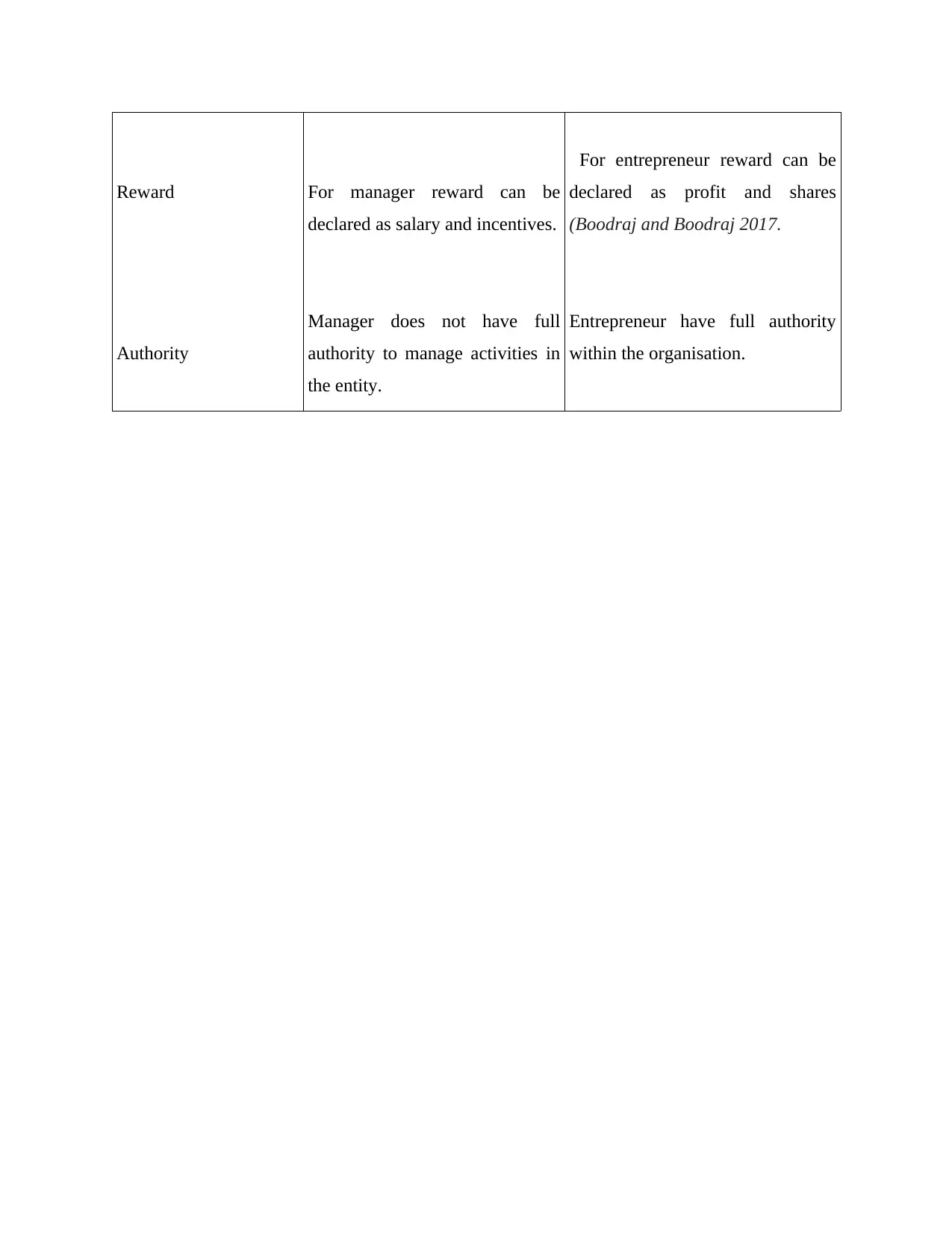
Reward
Authority
For manager reward can be
declared as salary and incentives.
Manager does not have full
authority to manage activities in
the entity.
For entrepreneur reward can be
declared as profit and shares
(Boodraj and Boodraj 2017.
Entrepreneur have full authority
within the organisation.
Authority
For manager reward can be
declared as salary and incentives.
Manager does not have full
authority to manage activities in
the entity.
For entrepreneur reward can be
declared as profit and shares
(Boodraj and Boodraj 2017.
Entrepreneur have full authority
within the organisation.
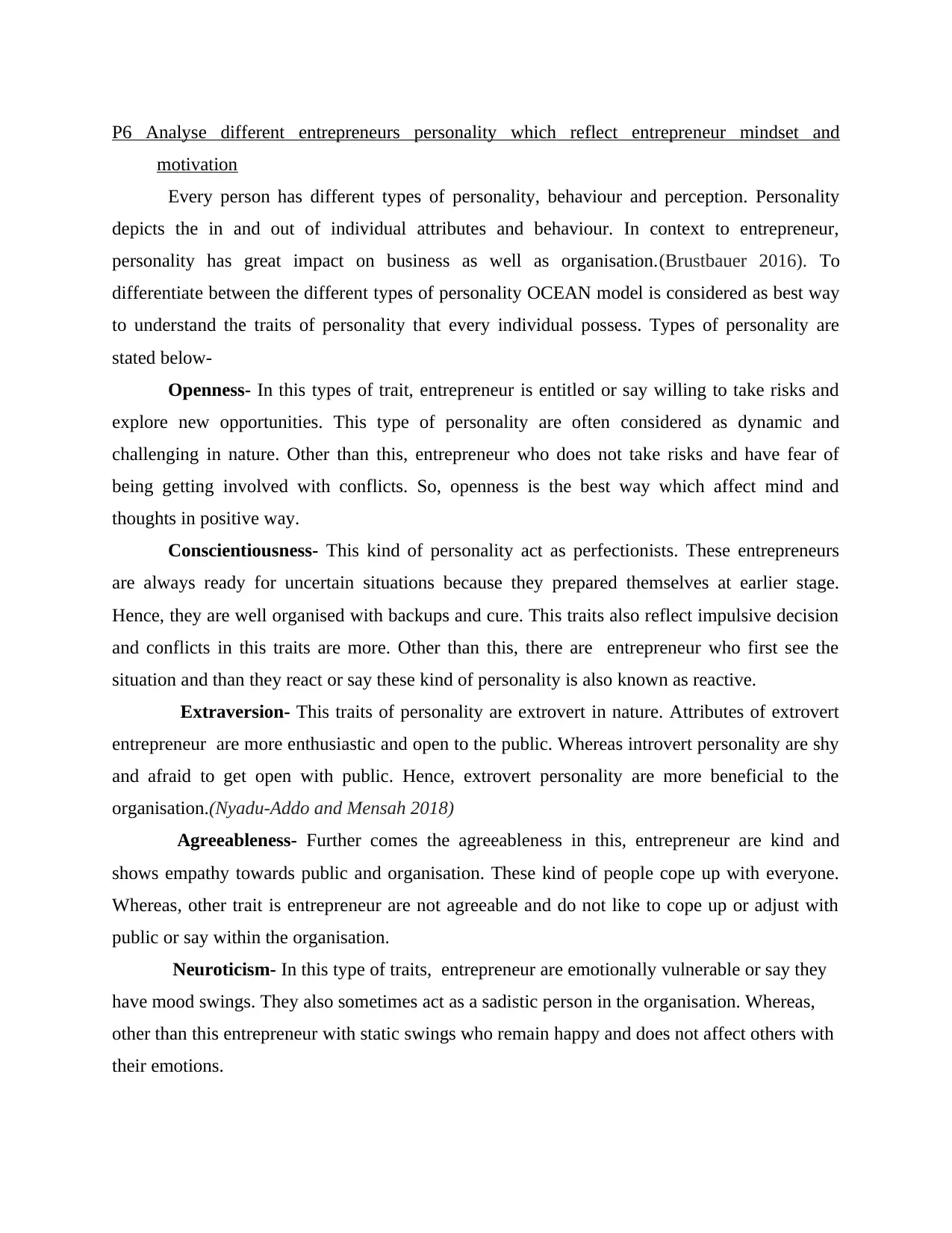
P6 Analyse different entrepreneurs personality which reflect entrepreneur mindset and
motivation
Every person has different types of personality, behaviour and perception. Personality
depicts the in and out of individual attributes and behaviour. In context to entrepreneur,
personality has great impact on business as well as organisation.(Brustbauer 2016). To
differentiate between the different types of personality OCEAN model is considered as best way
to understand the traits of personality that every individual possess. Types of personality are
stated below-
Openness- In this types of trait, entrepreneur is entitled or say willing to take risks and
explore new opportunities. This type of personality are often considered as dynamic and
challenging in nature. Other than this, entrepreneur who does not take risks and have fear of
being getting involved with conflicts. So, openness is the best way which affect mind and
thoughts in positive way.
Conscientiousness- This kind of personality act as perfectionists. These entrepreneurs
are always ready for uncertain situations because they prepared themselves at earlier stage.
Hence, they are well organised with backups and cure. This traits also reflect impulsive decision
and conflicts in this traits are more. Other than this, there are entrepreneur who first see the
situation and than they react or say these kind of personality is also known as reactive.
Extraversion- This traits of personality are extrovert in nature. Attributes of extrovert
entrepreneur are more enthusiastic and open to the public. Whereas introvert personality are shy
and afraid to get open with public. Hence, extrovert personality are more beneficial to the
organisation.(Nyadu-Addo and Mensah 2018)
Agreeableness- Further comes the agreeableness in this, entrepreneur are kind and
shows empathy towards public and organisation. These kind of people cope up with everyone.
Whereas, other trait is entrepreneur are not agreeable and do not like to cope up or adjust with
public or say within the organisation.
Neuroticism- In this type of traits, entrepreneur are emotionally vulnerable or say they
have mood swings. They also sometimes act as a sadistic person in the organisation. Whereas,
other than this entrepreneur with static swings who remain happy and does not affect others with
their emotions.
motivation
Every person has different types of personality, behaviour and perception. Personality
depicts the in and out of individual attributes and behaviour. In context to entrepreneur,
personality has great impact on business as well as organisation.(Brustbauer 2016). To
differentiate between the different types of personality OCEAN model is considered as best way
to understand the traits of personality that every individual possess. Types of personality are
stated below-
Openness- In this types of trait, entrepreneur is entitled or say willing to take risks and
explore new opportunities. This type of personality are often considered as dynamic and
challenging in nature. Other than this, entrepreneur who does not take risks and have fear of
being getting involved with conflicts. So, openness is the best way which affect mind and
thoughts in positive way.
Conscientiousness- This kind of personality act as perfectionists. These entrepreneurs
are always ready for uncertain situations because they prepared themselves at earlier stage.
Hence, they are well organised with backups and cure. This traits also reflect impulsive decision
and conflicts in this traits are more. Other than this, there are entrepreneur who first see the
situation and than they react or say these kind of personality is also known as reactive.
Extraversion- This traits of personality are extrovert in nature. Attributes of extrovert
entrepreneur are more enthusiastic and open to the public. Whereas introvert personality are shy
and afraid to get open with public. Hence, extrovert personality are more beneficial to the
organisation.(Nyadu-Addo and Mensah 2018)
Agreeableness- Further comes the agreeableness in this, entrepreneur are kind and
shows empathy towards public and organisation. These kind of people cope up with everyone.
Whereas, other trait is entrepreneur are not agreeable and do not like to cope up or adjust with
public or say within the organisation.
Neuroticism- In this type of traits, entrepreneur are emotionally vulnerable or say they
have mood swings. They also sometimes act as a sadistic person in the organisation. Whereas,
other than this entrepreneur with static swings who remain happy and does not affect others with
their emotions.
Secure Best Marks with AI Grader
Need help grading? Try our AI Grader for instant feedback on your assignments.

M3 Also, explore and examine different lines of argument relating to entrepreneurial traits
Every entrepreneur has different characteristics and according to which they react and
behave in organisation. There are various types of traits which are neuroticism, extra-version,
agreeableness, openness, conscientiousness. According to these characteristics they lead the team
in business
Every entrepreneur has different characteristics and according to which they react and
behave in organisation. There are various types of traits which are neuroticism, extra-version,
agreeableness, openness, conscientiousness. According to these characteristics they lead the team
in business

TASK 4
P7 Background and Experiences of an Entrepreneurs
For, the successful entrepreneur it is very important to know about the family background
and their experiences in the past decades. It helps in the innovations of the new products where
the market is developed(Baric, Franic and Polak 2016) . The main aim of an entrepreneur is to
gain more profits and generate income from the available resources. Further, it also helps in the
growth which lead to increase in the productivity of the business.
Family Background
Elon Musk was born on 28 June, 1971 in Pretoria, South Africa. When he was 10, he
made his interest in the computer field that how to do programming and then at the age of 12 he
sold his first software of gaming which is called Blastar. His mother named Maye Musk who has
worked at many places to support her family. His father Errrol Musk who is an engineer, at the
age of 10 his parents got divorced. Musk had left Canada for further study in business and
physics. He has graduated with the degree in economics and got second in the degree of physics.
Richard Branson was born on 18 July 1950 in Surrey, England. He has the struggling life
in the school and then he has drop the school at the age of 16. His mother Eve Branson employed
in the flight as a attendant. His father Edward James Branson has worked for a barrister. Branson
has formed the Virgin Mail Order Records for raising the funds. He is now the co-founder of the
Virgin group Ltd. Which deals in the hot-air ballooning and powerboat racing.
Interest
Musk has changed their mind-set and after that he felt that the internet has more
opportunity rather than in physics. Firstly, he found the Zip2 company which provides the maps
and the directions. Further, PayPAL company which provides the online transfer money.
Moreover, he also founded the SpaceX company which makes the rockets at affordable prices.
Tesla motor company which provides the electrical vehicles(Sozuer, Altuntas and Semercioz
2017) .
Branson has dropped the school at the age of 16 and his interest in the business of the
aircraft hot-air ballooning. It has faced many challenges during his life around the world and
across the Atlantic for sailing. It has founded many virgin companies which includes the Virgin
Group, Virgin Records.
18
P7 Background and Experiences of an Entrepreneurs
For, the successful entrepreneur it is very important to know about the family background
and their experiences in the past decades. It helps in the innovations of the new products where
the market is developed(Baric, Franic and Polak 2016) . The main aim of an entrepreneur is to
gain more profits and generate income from the available resources. Further, it also helps in the
growth which lead to increase in the productivity of the business.
Family Background
Elon Musk was born on 28 June, 1971 in Pretoria, South Africa. When he was 10, he
made his interest in the computer field that how to do programming and then at the age of 12 he
sold his first software of gaming which is called Blastar. His mother named Maye Musk who has
worked at many places to support her family. His father Errrol Musk who is an engineer, at the
age of 10 his parents got divorced. Musk had left Canada for further study in business and
physics. He has graduated with the degree in economics and got second in the degree of physics.
Richard Branson was born on 18 July 1950 in Surrey, England. He has the struggling life
in the school and then he has drop the school at the age of 16. His mother Eve Branson employed
in the flight as a attendant. His father Edward James Branson has worked for a barrister. Branson
has formed the Virgin Mail Order Records for raising the funds. He is now the co-founder of the
Virgin group Ltd. Which deals in the hot-air ballooning and powerboat racing.
Interest
Musk has changed their mind-set and after that he felt that the internet has more
opportunity rather than in physics. Firstly, he found the Zip2 company which provides the maps
and the directions. Further, PayPAL company which provides the online transfer money.
Moreover, he also founded the SpaceX company which makes the rockets at affordable prices.
Tesla motor company which provides the electrical vehicles(Sozuer, Altuntas and Semercioz
2017) .
Branson has dropped the school at the age of 16 and his interest in the business of the
aircraft hot-air ballooning. It has faced many challenges during his life around the world and
across the Atlantic for sailing. It has founded many virgin companies which includes the Virgin
Group, Virgin Records.
18
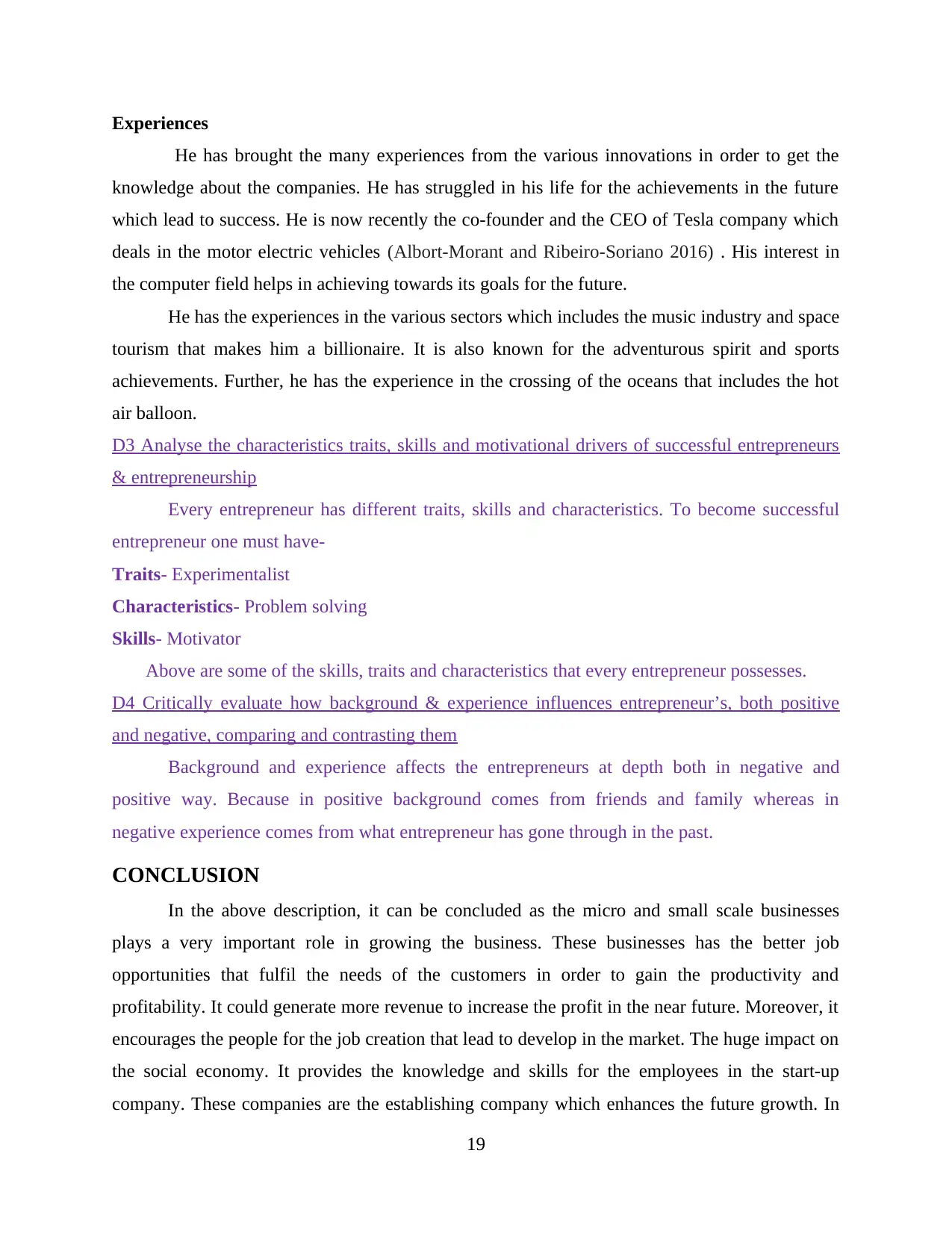
Experiences
He has brought the many experiences from the various innovations in order to get the
knowledge about the companies. He has struggled in his life for the achievements in the future
which lead to success. He is now recently the co-founder and the CEO of Tesla company which
deals in the motor electric vehicles (Albort-Morant and Ribeiro-Soriano 2016) . His interest in
the computer field helps in achieving towards its goals for the future.
He has the experiences in the various sectors which includes the music industry and space
tourism that makes him a billionaire. It is also known for the adventurous spirit and sports
achievements. Further, he has the experience in the crossing of the oceans that includes the hot
air balloon.
D3 Analyse the characteristics traits, skills and motivational drivers of successful entrepreneurs
& entrepreneurship
Every entrepreneur has different traits, skills and characteristics. To become successful
entrepreneur one must have-
Traits- Experimentalist
Characteristics- Problem solving
Skills- Motivator
Above are some of the skills, traits and characteristics that every entrepreneur possesses.
D4 Critically evaluate how background & experience influences entrepreneur’s, both positive
and negative, comparing and contrasting them
Background and experience affects the entrepreneurs at depth both in negative and
positive way. Because in positive background comes from friends and family whereas in
negative experience comes from what entrepreneur has gone through in the past.
CONCLUSION
In the above description, it can be concluded as the micro and small scale businesses
plays a very important role in growing the business. These businesses has the better job
opportunities that fulfil the needs of the customers in order to gain the productivity and
profitability. It could generate more revenue to increase the profit in the near future. Moreover, it
encourages the people for the job creation that lead to develop in the market. The huge impact on
the social economy. It provides the knowledge and skills for the employees in the start-up
company. These companies are the establishing company which enhances the future growth. In
19
He has brought the many experiences from the various innovations in order to get the
knowledge about the companies. He has struggled in his life for the achievements in the future
which lead to success. He is now recently the co-founder and the CEO of Tesla company which
deals in the motor electric vehicles (Albort-Morant and Ribeiro-Soriano 2016) . His interest in
the computer field helps in achieving towards its goals for the future.
He has the experiences in the various sectors which includes the music industry and space
tourism that makes him a billionaire. It is also known for the adventurous spirit and sports
achievements. Further, he has the experience in the crossing of the oceans that includes the hot
air balloon.
D3 Analyse the characteristics traits, skills and motivational drivers of successful entrepreneurs
& entrepreneurship
Every entrepreneur has different traits, skills and characteristics. To become successful
entrepreneur one must have-
Traits- Experimentalist
Characteristics- Problem solving
Skills- Motivator
Above are some of the skills, traits and characteristics that every entrepreneur possesses.
D4 Critically evaluate how background & experience influences entrepreneur’s, both positive
and negative, comparing and contrasting them
Background and experience affects the entrepreneurs at depth both in negative and
positive way. Because in positive background comes from friends and family whereas in
negative experience comes from what entrepreneur has gone through in the past.
CONCLUSION
In the above description, it can be concluded as the micro and small scale businesses
plays a very important role in growing the business. These businesses has the better job
opportunities that fulfil the needs of the customers in order to gain the productivity and
profitability. It could generate more revenue to increase the profit in the near future. Moreover, it
encourages the people for the job creation that lead to develop in the market. The huge impact on
the social economy. It provides the knowledge and skills for the employees in the start-up
company. These companies are the establishing company which enhances the future growth. In
19
Paraphrase This Document
Need a fresh take? Get an instant paraphrase of this document with our AI Paraphraser

addition to this, start-up company provides the GDP which grows for the development in the
society. New technologies and innovations are determined by the employees from existing
product to the new products and services.
20
society. New technologies and innovations are determined by the employees from existing
product to the new products and services.
20
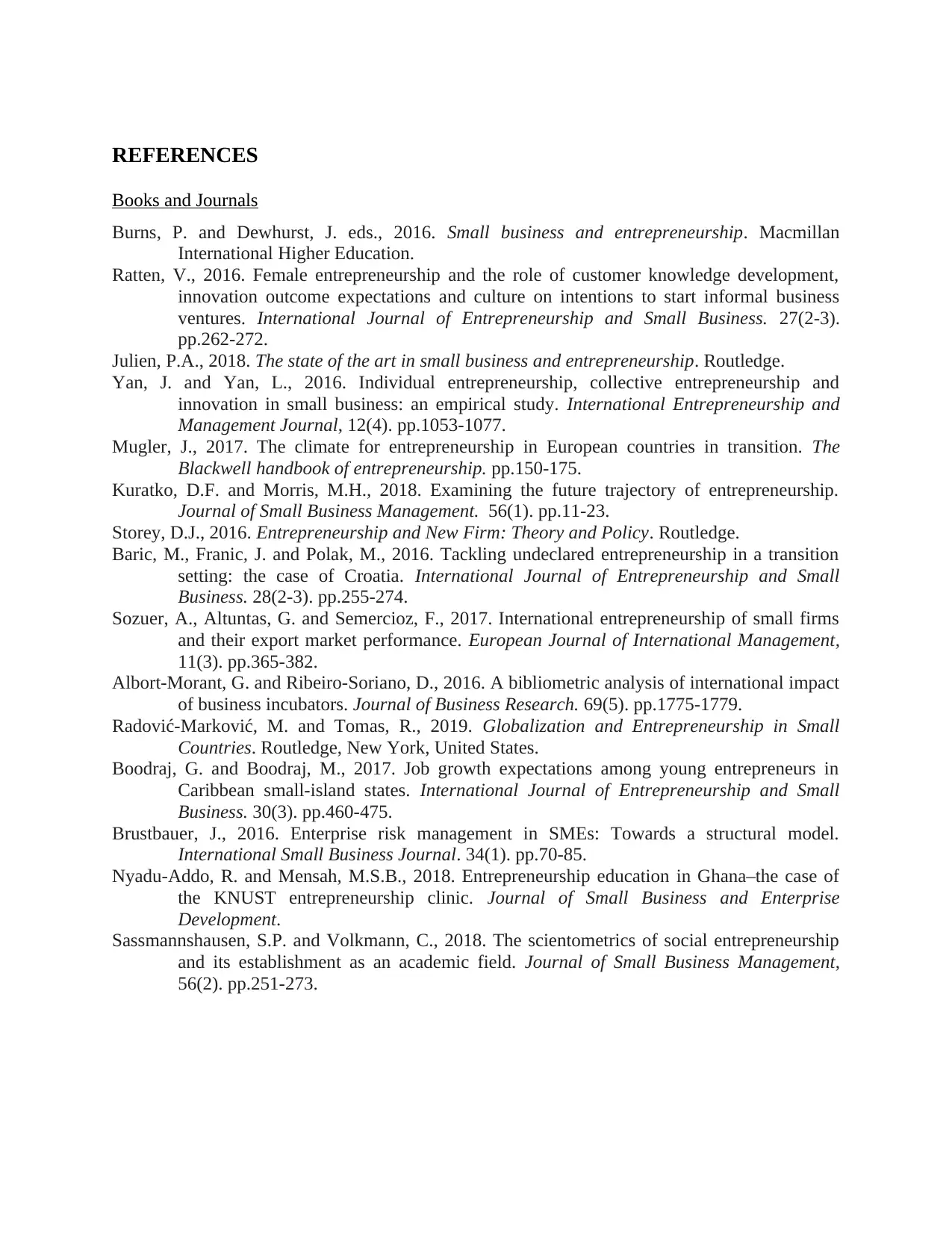
REFERENCES
Books and Journals
Burns, P. and Dewhurst, J. eds., 2016. Small business and entrepreneurship. Macmillan
International Higher Education.
Ratten, V., 2016. Female entrepreneurship and the role of customer knowledge development,
innovation outcome expectations and culture on intentions to start informal business
ventures. International Journal of Entrepreneurship and Small Business. 27(2-3).
pp.262-272.
Julien, P.A., 2018. The state of the art in small business and entrepreneurship. Routledge.
Yan, J. and Yan, L., 2016. Individual entrepreneurship, collective entrepreneurship and
innovation in small business: an empirical study. International Entrepreneurship and
Management Journal, 12(4). pp.1053-1077.
Mugler, J., 2017. The climate for entrepreneurship in European countries in transition. The
Blackwell handbook of entrepreneurship. pp.150-175.
Kuratko, D.F. and Morris, M.H., 2018. Examining the future trajectory of entrepreneurship.
Journal of Small Business Management. 56(1). pp.11-23.
Storey, D.J., 2016. Entrepreneurship and New Firm: Theory and Policy. Routledge.
Baric, M., Franic, J. and Polak, M., 2016. Tackling undeclared entrepreneurship in a transition
setting: the case of Croatia. International Journal of Entrepreneurship and Small
Business. 28(2-3). pp.255-274.
Sozuer, A., Altuntas, G. and Semercioz, F., 2017. International entrepreneurship of small firms
and their export market performance. European Journal of International Management,
11(3). pp.365-382.
Albort-Morant, G. and Ribeiro-Soriano, D., 2016. A bibliometric analysis of international impact
of business incubators. Journal of Business Research. 69(5). pp.1775-1779.
Radović-Marković, M. and Tomas, R., 2019. Globalization and Entrepreneurship in Small
Countries. Routledge, New York, United States.
Boodraj, G. and Boodraj, M., 2017. Job growth expectations among young entrepreneurs in
Caribbean small-island states. International Journal of Entrepreneurship and Small
Business. 30(3). pp.460-475.
Brustbauer, J., 2016. Enterprise risk management in SMEs: Towards a structural model.
International Small Business Journal. 34(1). pp.70-85.
Nyadu-Addo, R. and Mensah, M.S.B., 2018. Entrepreneurship education in Ghana–the case of
the KNUST entrepreneurship clinic. Journal of Small Business and Enterprise
Development.
Sassmannshausen, S.P. and Volkmann, C., 2018. The scientometrics of social entrepreneurship
and its establishment as an academic field. Journal of Small Business Management,
56(2). pp.251-273.
Books and Journals
Burns, P. and Dewhurst, J. eds., 2016. Small business and entrepreneurship. Macmillan
International Higher Education.
Ratten, V., 2016. Female entrepreneurship and the role of customer knowledge development,
innovation outcome expectations and culture on intentions to start informal business
ventures. International Journal of Entrepreneurship and Small Business. 27(2-3).
pp.262-272.
Julien, P.A., 2018. The state of the art in small business and entrepreneurship. Routledge.
Yan, J. and Yan, L., 2016. Individual entrepreneurship, collective entrepreneurship and
innovation in small business: an empirical study. International Entrepreneurship and
Management Journal, 12(4). pp.1053-1077.
Mugler, J., 2017. The climate for entrepreneurship in European countries in transition. The
Blackwell handbook of entrepreneurship. pp.150-175.
Kuratko, D.F. and Morris, M.H., 2018. Examining the future trajectory of entrepreneurship.
Journal of Small Business Management. 56(1). pp.11-23.
Storey, D.J., 2016. Entrepreneurship and New Firm: Theory and Policy. Routledge.
Baric, M., Franic, J. and Polak, M., 2016. Tackling undeclared entrepreneurship in a transition
setting: the case of Croatia. International Journal of Entrepreneurship and Small
Business. 28(2-3). pp.255-274.
Sozuer, A., Altuntas, G. and Semercioz, F., 2017. International entrepreneurship of small firms
and their export market performance. European Journal of International Management,
11(3). pp.365-382.
Albort-Morant, G. and Ribeiro-Soriano, D., 2016. A bibliometric analysis of international impact
of business incubators. Journal of Business Research. 69(5). pp.1775-1779.
Radović-Marković, M. and Tomas, R., 2019. Globalization and Entrepreneurship in Small
Countries. Routledge, New York, United States.
Boodraj, G. and Boodraj, M., 2017. Job growth expectations among young entrepreneurs in
Caribbean small-island states. International Journal of Entrepreneurship and Small
Business. 30(3). pp.460-475.
Brustbauer, J., 2016. Enterprise risk management in SMEs: Towards a structural model.
International Small Business Journal. 34(1). pp.70-85.
Nyadu-Addo, R. and Mensah, M.S.B., 2018. Entrepreneurship education in Ghana–the case of
the KNUST entrepreneurship clinic. Journal of Small Business and Enterprise
Development.
Sassmannshausen, S.P. and Volkmann, C., 2018. The scientometrics of social entrepreneurship
and its establishment as an academic field. Journal of Small Business Management,
56(2). pp.251-273.

2
1 out of 22
Related Documents
Your All-in-One AI-Powered Toolkit for Academic Success.
+13062052269
info@desklib.com
Available 24*7 on WhatsApp / Email
![[object Object]](/_next/static/media/star-bottom.7253800d.svg)
Unlock your academic potential
© 2024 | Zucol Services PVT LTD | All rights reserved.





